
[ad_1]
The first day of the United Nations General Assembly meeting kicked off in downtown Manhattan Tuesday, bringing in speakers from around the world to discuss the globe’s most pressing challenges.
Leaders spoke of the many global crises presently faced, including the climate crisis, rampant inequality, Russia’s ongoing war in Ukraine, and geopolitical instability.
Here are some highlights of the leaders who spoke on Day 1:
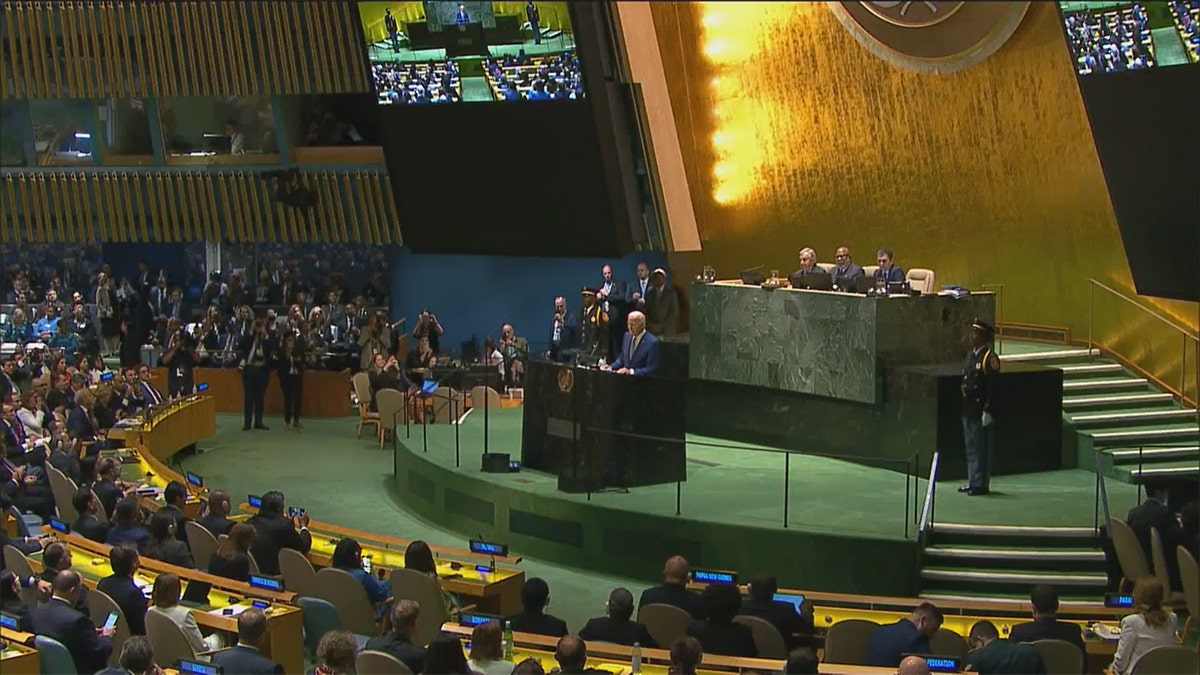
President Joe Biden talking at the UN. (Fox News)
UN SECRETARY-GENERAL
UN Secretary-General António Guterres evoked the recent floods in Libya which – according to estimates from government officials and aid agencies – caused between 4,000 and 11,000 deaths. Guterres echoed the conclusions of scientists who have said that climate change made the devastating storm 50% more intense.
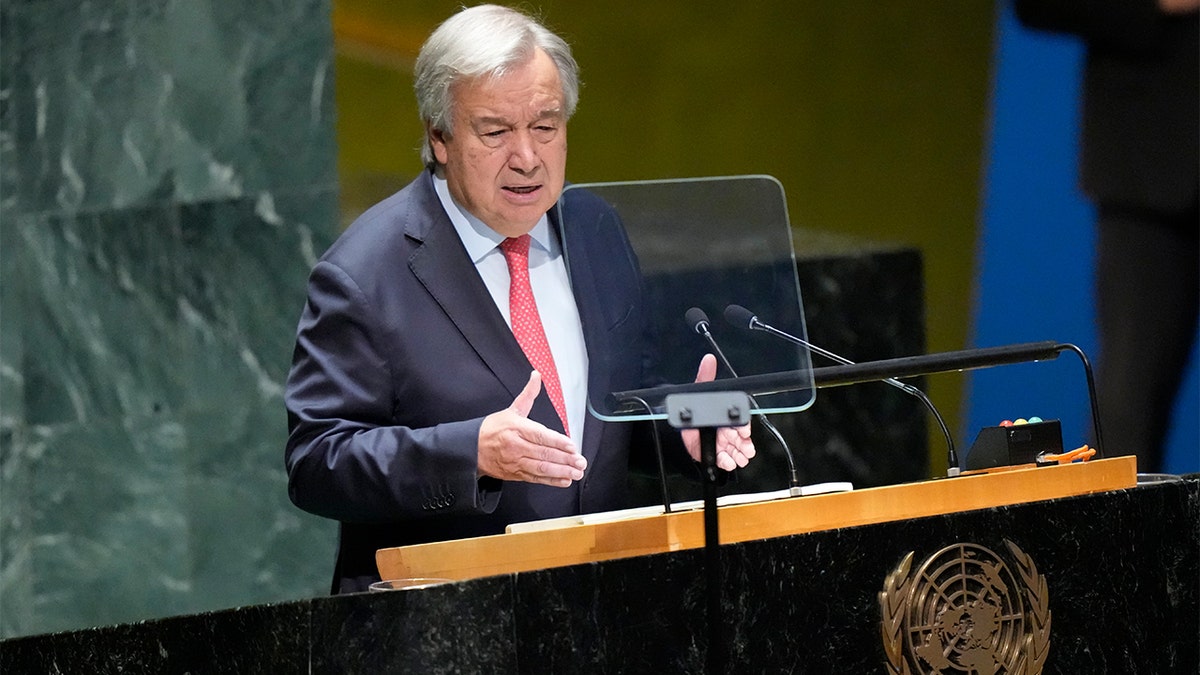
United Nations Secretary-General Antonio Guterres addresses the 78th session of the United Nations General Assembly, Tuesday, Sept. 19, 2023 at United Nations headquarters. (AP Photo/Mary Altaffer)
“In the face of all these challenges and more, compromise has become a dirty word. Our world needs statesmanship, not gamesmanship and gridlock. As I told the G20, it is time for a global compromise. Politics is compromise. Diplomacy is compromise,” he said. “Effective leadership is compromise. Leaders have a special responsibility to achieve compromise in building a common future of peace and prosperity for our common good.”
PRESIDENT OF THE GENERAL ASSEMBLY
Dennis Francis, the president of this year’s U.N. General Assembly, said a common, global approach is needed now more than ever as the global faces geopolitical conflicts, climate change, debt, energy and food crises, as well as poverty and famine.
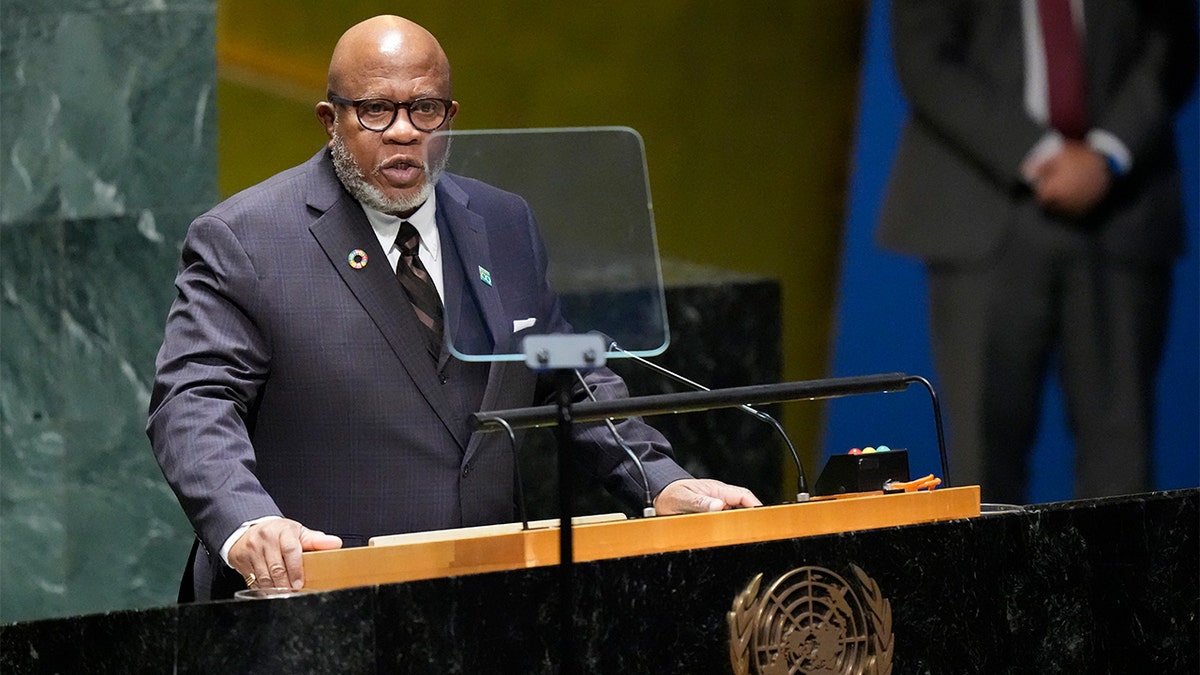
President of the General Assembly Dennis Francis addresses the 78th session of the United Nations General Assembly, Tuesday, Sept. 19, 2023 at United Nations headquarters. (AP Photo/Mary Altaffer)
“This year our imperative is clear: to unite the nations, to be united in conviction of common purpose and in solidarity of action,” Francis said.
BRAZIL
Brazilian President Luiz Inácio Lula da Silva proclaimed that “Brazil is back,” drawing a distinction with his predecessor, Jair Bolsonaro, who showed little interest in geopolitics or diplomacy during his four years in office.
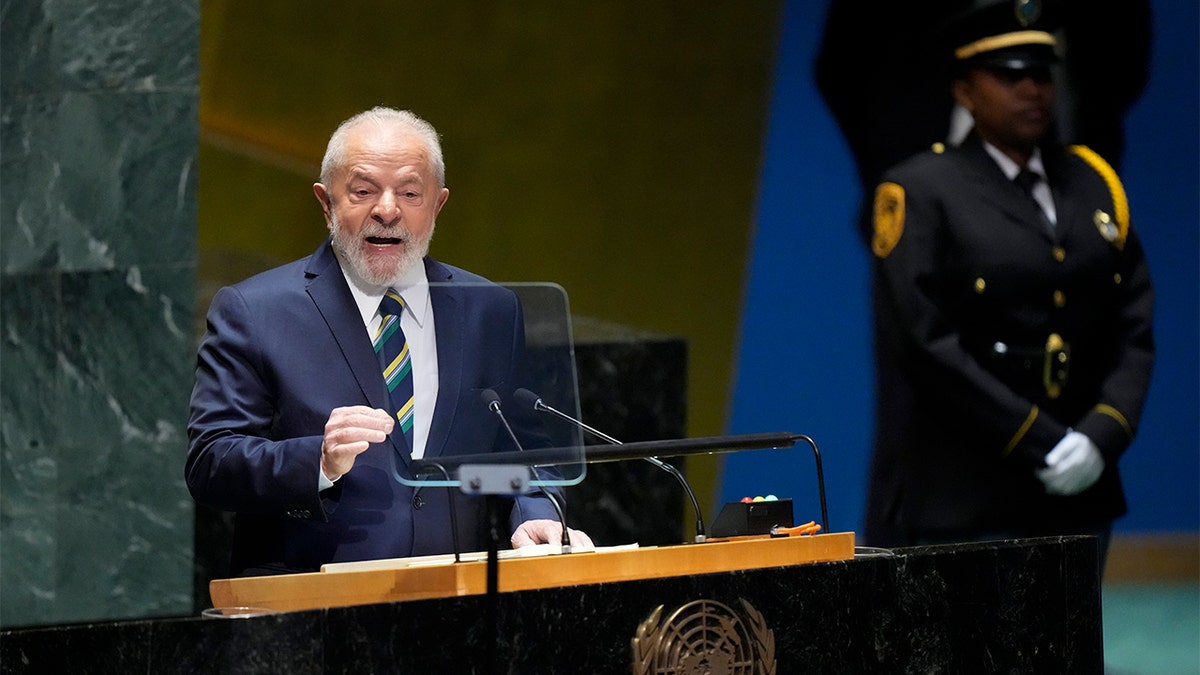
Brazilian President Luiz Inacio Lula da Silva addresses the 78th session of the United Nations General Assembly, Tuesday, Sept. 19, 2023 at United Nations headquarters. (AP)
“Brazil is reencountering itself, the region, the world and multilateralism,” Lula said. “As I never tire of saying, Brazil is back. Our country is back to give our due contribution to face the world’s primary challenges.”
Last year, the left-wing president narrowly won the election before Bolsonaro supporters stormed the capital in protest.
UNITED STATES
U.S. President Joe Biden made his case before the General Assembly that the world must stand united behind Ukraine as it battles Russian aggression.
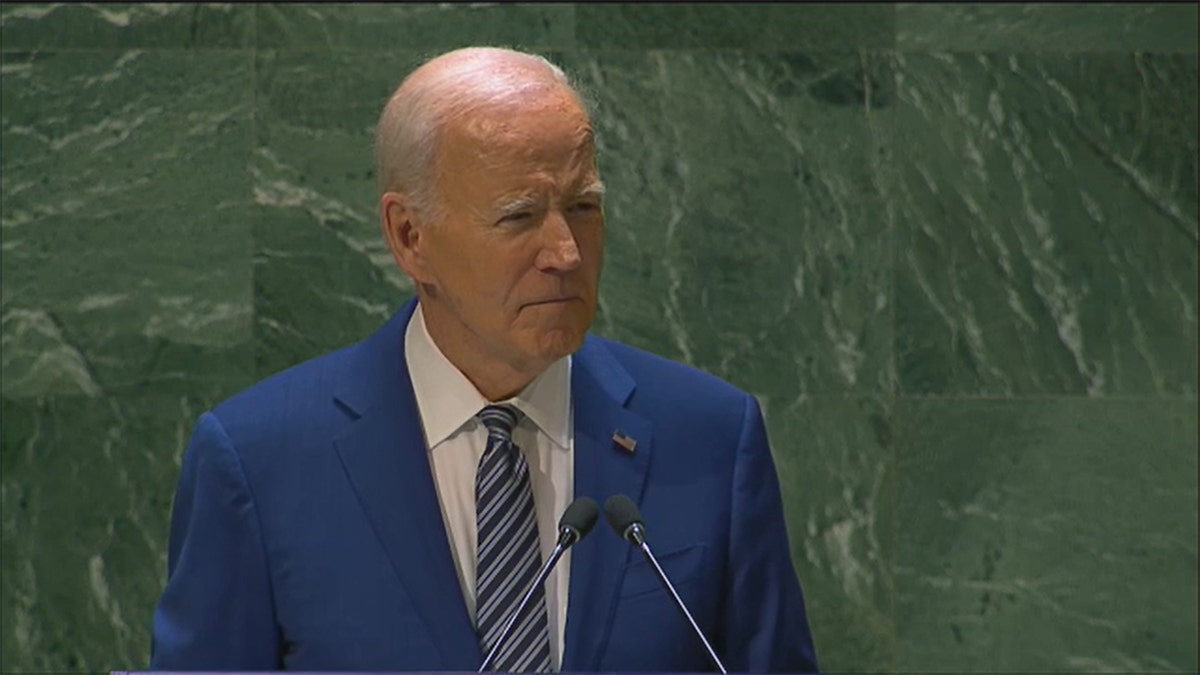
President Biden address the UN in reforming the World Trade Organization. (Fox News)
“I ask you this: If we abandon the core principles of the United States to appease an aggressor, can any member state in this body feel confident that they are protected?” Biden said in his address. “If we allow Ukraine to be carved up, is the independence of any nation secure?
COLOMBIA
Columbian President Gustavo Petro painted a dark picture if the nations of the world do not address climate change.
With grandiose language, Petro said the past year was one that “humanity lost” as it “advanced the times of extinction.”
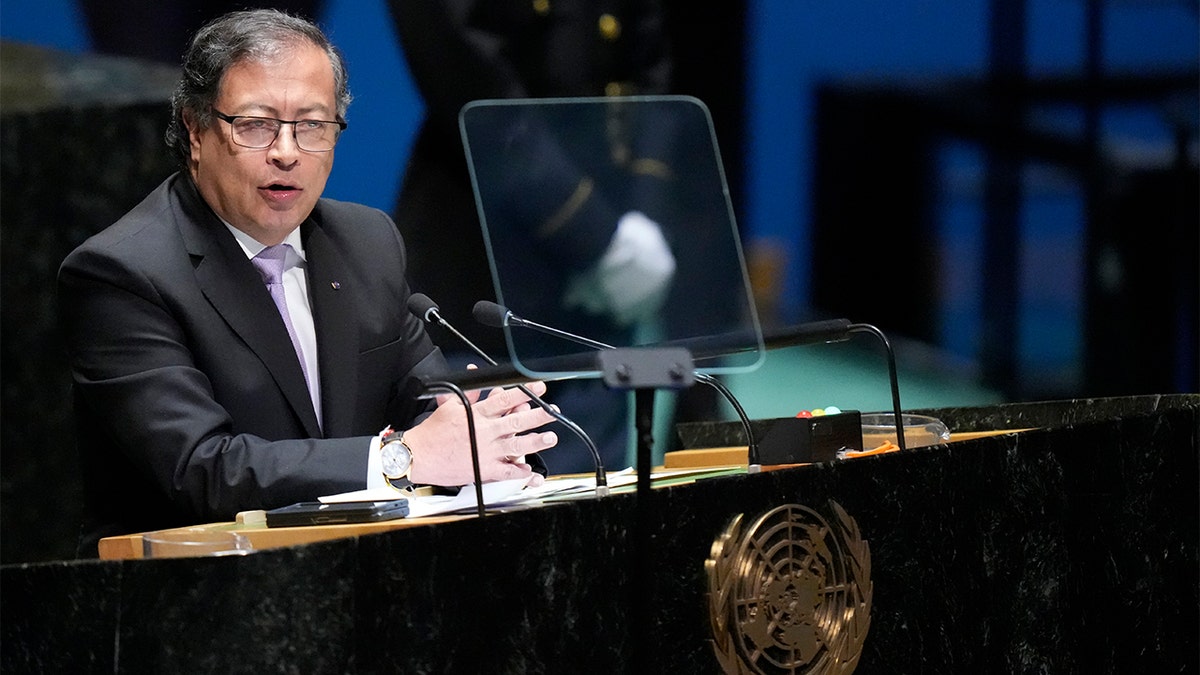
Colombian President Gustavo Petro Urrego addresses the 78th session of the United Nations General Assembly, Tuesday, Sept. 19, 2023 at United Nations headquarters. (AP Photo/Mary Altaffer)
He warned that the climate crisis has exacerbated the refugee crisis, warning that in the next half-century, climate refugees could reach 3 billion.
JORDAN
Jordan’s King Abdullah touched on the refugee crisis, saying his country does not have the ability to host, nor care for more Syrian refugees.
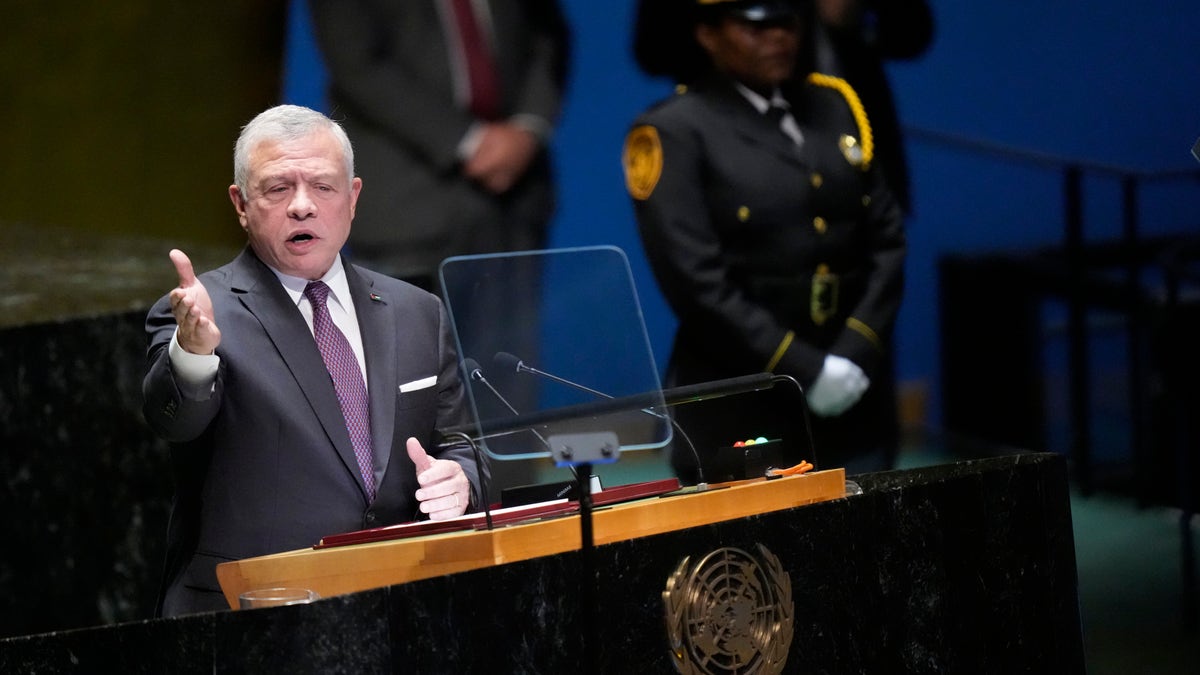
Jordanian King Abdullah addresses the 78th session of the United Nations General Assembly, Tuesday, Sept. 19, 2023 at United Nations headquarters. (AP Photo/Mary Altaffer) (AP Photo/Mary Altaffer)
“Syrian refugees’ future is in their country, not in host countries,” he said. “But until they are able to return, we must all do right by them.”
EMIR OF QATAR SAYS SPORTS CAN PLAY A ROLE IN ‘BUILDING BRIDGES’ BETWEEN PEOPLES
POLAND
Polish President Andrzej Duda likened the Russian invasion of Ukraine to the World War II occupation and partition of his own country by Nazi Germany and the Soviet Union. He urged the world to hold Moscow accountable for its “barbaric actions.”
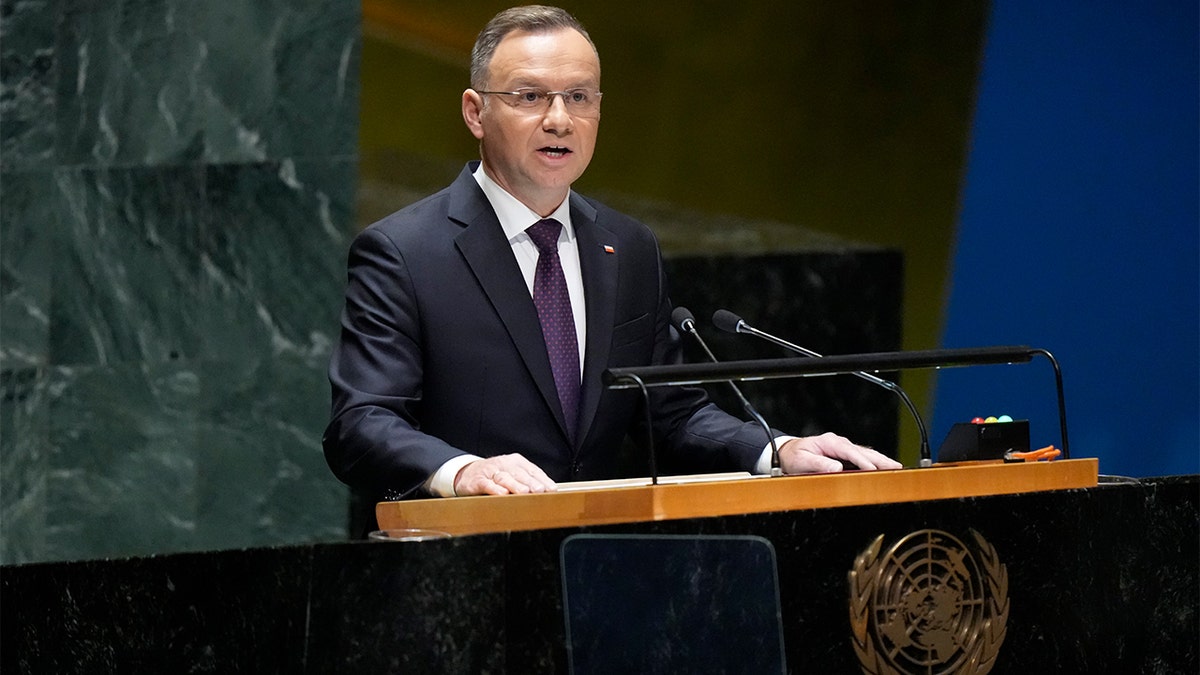
Polish President Andrzej Duda addresses the 78th session of the United Nations General Assembly, Tuesday, Sept. 19, 2023 at United Nations headquarters. (AP Photo/Mary Altaffer)
“Poland lost its independence, was wiped (off) the map of the world, and subjected to an extremely brutal occupation. This is precisely why we understand the tragedy of Ukraine better than any other country,” Duda said.
CUBA
Cuban President Miguel Díaz-Canel took aim at the U.S., calling its foreign policy with some countries – including his own – “unilateral” and “coercive.” His speech was noticeably absent, any mention of Russia, which supports the island nation.
Díaz-Canel said U.S. sanctions “today also affect Venezuela, Nicaragua and, before and after, they have been the prelude to invasions and (the) overthrow of uncomfortable governments in the Middle East.”
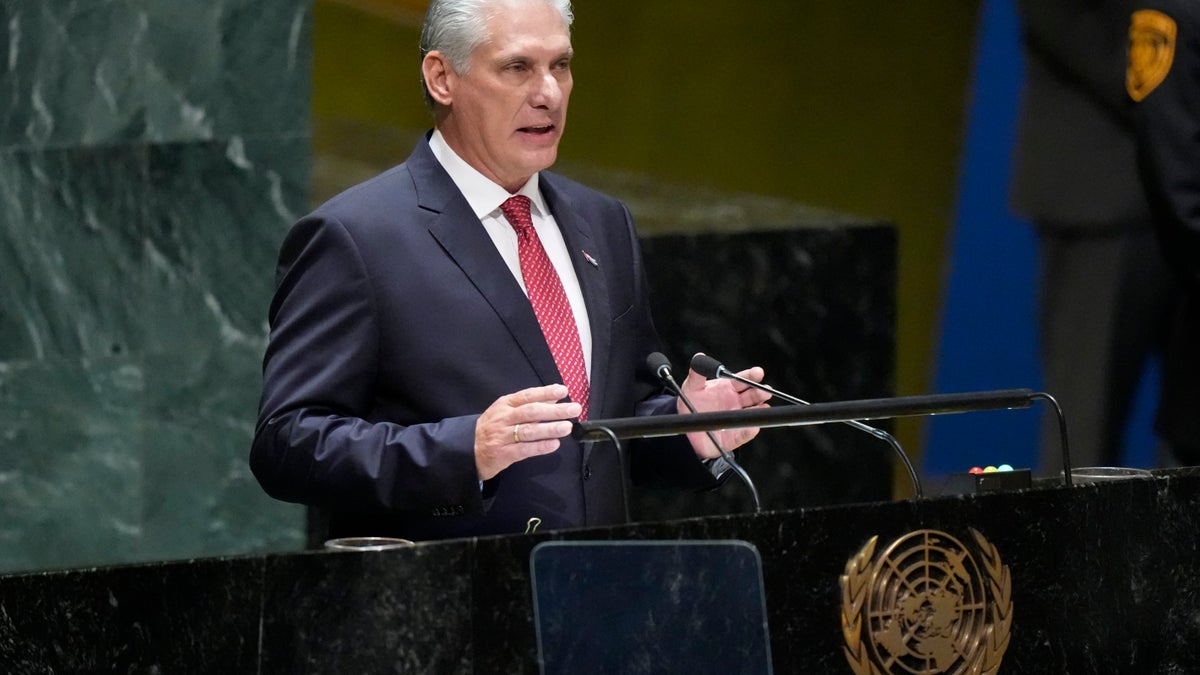
Cuban President Miguel Díaz-Canel addresses the 78th session of the United Nations General Assembly, Tuesday, Sept. 19, 2023 at United Nations headquarters. (AP Photo/Mary Altaffer)
“We reject the coercive and unilateral measures imposed on countries like Zimbabwe, Syria, the Democratic Republic of Korea and Iran, among many other countries whose people suffer the negative impact of these,” he said.
His comments come days after he and Brazilian President Lula reignited ties between the countries at the G77 summit in Havana, with the former lamenting the U.S. embargo of Cuba.
TURKEY
Turkish President Recep Tayyip Erdoğan called for peace in the Caucasus region amid renewed fighting in a war-torn Nagorno-Karabakh region.
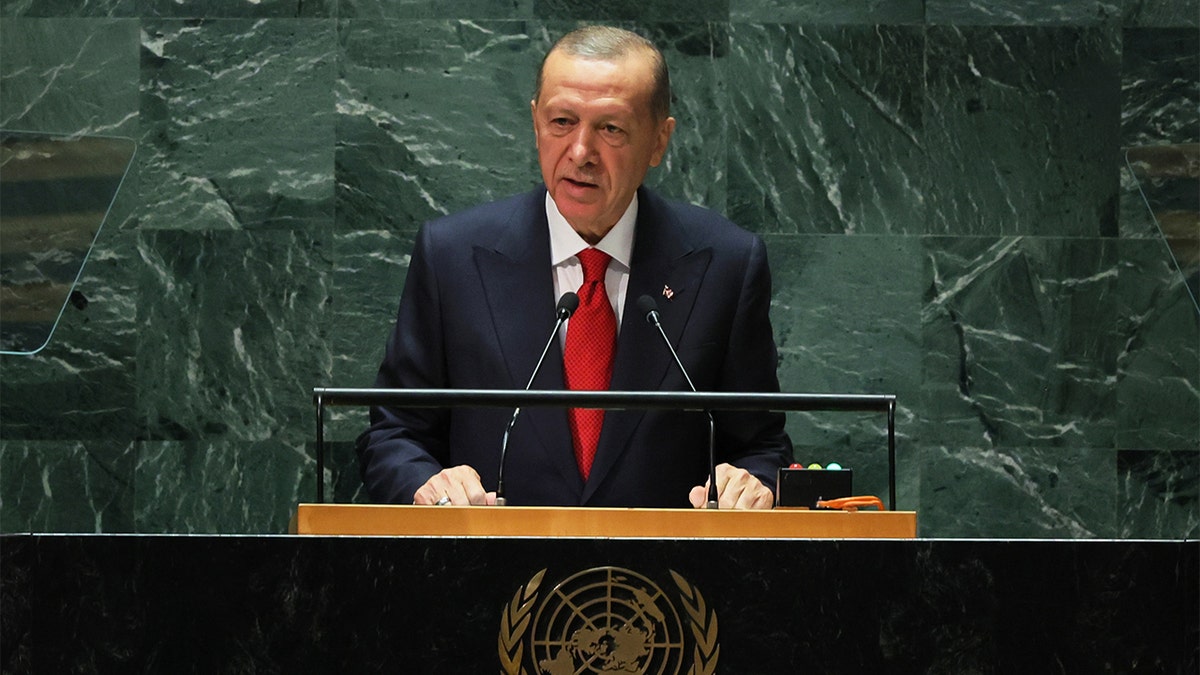
NEW YORK, NEW YORK – SEPTEMBER 19: President of Türkiye Recep Tayyip Erdoğan speaks during the United Nations General Assembly (UNGA) at the United Nations headquarters on September 19, 2023 in New York City. (Michael M. Santiago/Getty Images)
“In order to make use of this opportunity we attach importance to the normalization of our relations with Armenia,” Erdogan said. “From the outset we always supported diplomacy between Azerbaijan and Armenia. Unfortunately, we see that Armenia cannot make use of this historic opportunity.”
PORTUGAL
Portugues President Marcelo de Sousa stressed the need for more action and less talk on global inequality, climate change, and reforming international institutions in the wake of the war in Ukraine.
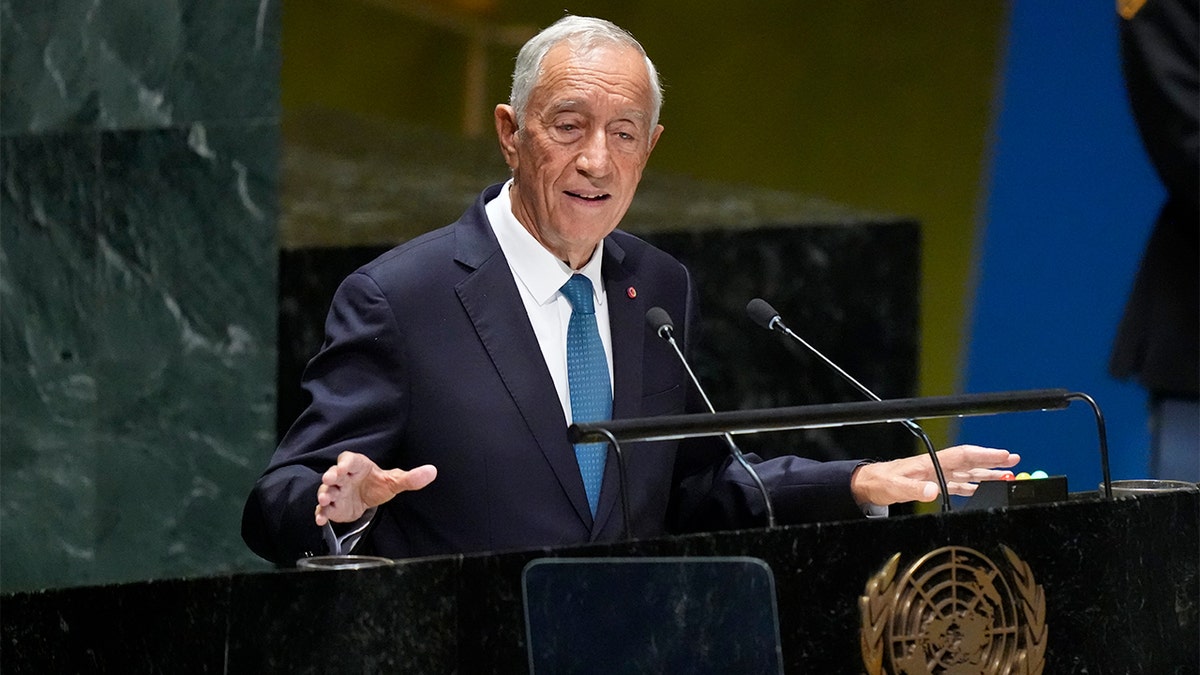
Portuguese President Marcelo Rebelo de Sousa addresses the 78th session of the United Nations General Assembly, Tuesday, Sept. 19, 2023 at United Nations headquarters. (AP Photo/Mary Altaffer)
“Year after year, we promise. It’s time to fulfill,” he said, warning that without reform: “there is no multilateralism possible, there is no lasting cooperation, there is no peace, all over the world.”
QATAR
Sheikh Tamim bin Hamad al-Thani, the emir of Qatar, said Tuesday that sports can play a role in uniting different peoples and cultures across the world.
At the United Nations General Assembly, Sheikh Tamim touted the “tremendous potentials and opportunities” that belong to his small Arab country, which hosted the soccer World Cup last fall.
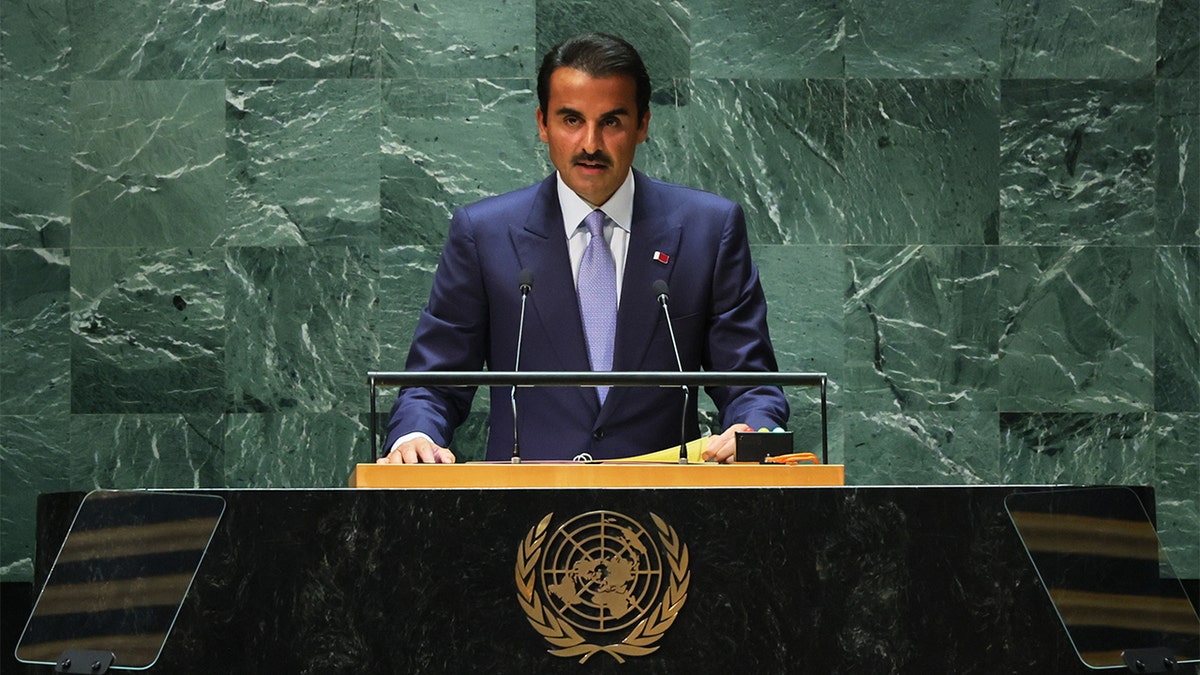
NEW YORK, NEW YORK – SEPTEMBER 19: Emir of Qatar Sheikh Tamim bin Hamad al-Thani speaks during the United Nations General Assembly (UNGA) at the United Nations headquarters on September 19, 2023, in New York City. (Michael M. Santiago/Getty Images)
“During the 2022 World Cup in Qatar, there was an opportunity for interaction between peoples, and it was an opportunity for the world to see our people as they are and to learn about our culture and values,” Sheikh Tamim said, calling Qatar a “global destination and nexus between East and West.”
SOUTH AFRICA
South African President Cyril Ramaphosa acknowledged the over-representation of men in the room, asking: “Where are the women of the world?”
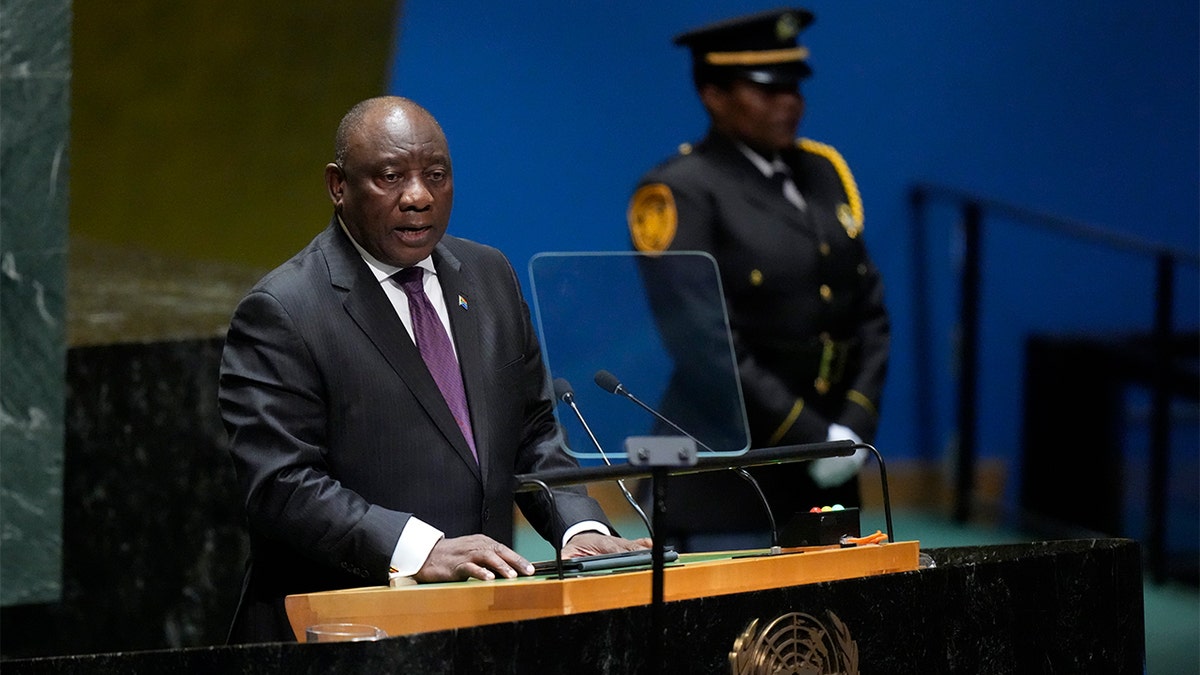
South African President Cyril Ramaphosa addresses the 78th session of the United Nations General Assembly, Tuesday, Sept. 19, 2023 at United Nations headquarters. (AP Photo/Mary Altaffer) (AP)
In his speech, he stressed the need to empower women and have them participate equally in decision-making. Fifty percent of cabinet members in South Africa are women, and Ramaphosa said he was accompanied by an all-female delegation to the United Nations.
TURKMENISTAN
President of Turkmenistan Serdar Berdimuhamedow called for multilateralism, as the world faces “very serious challenges out of multiple regions.”
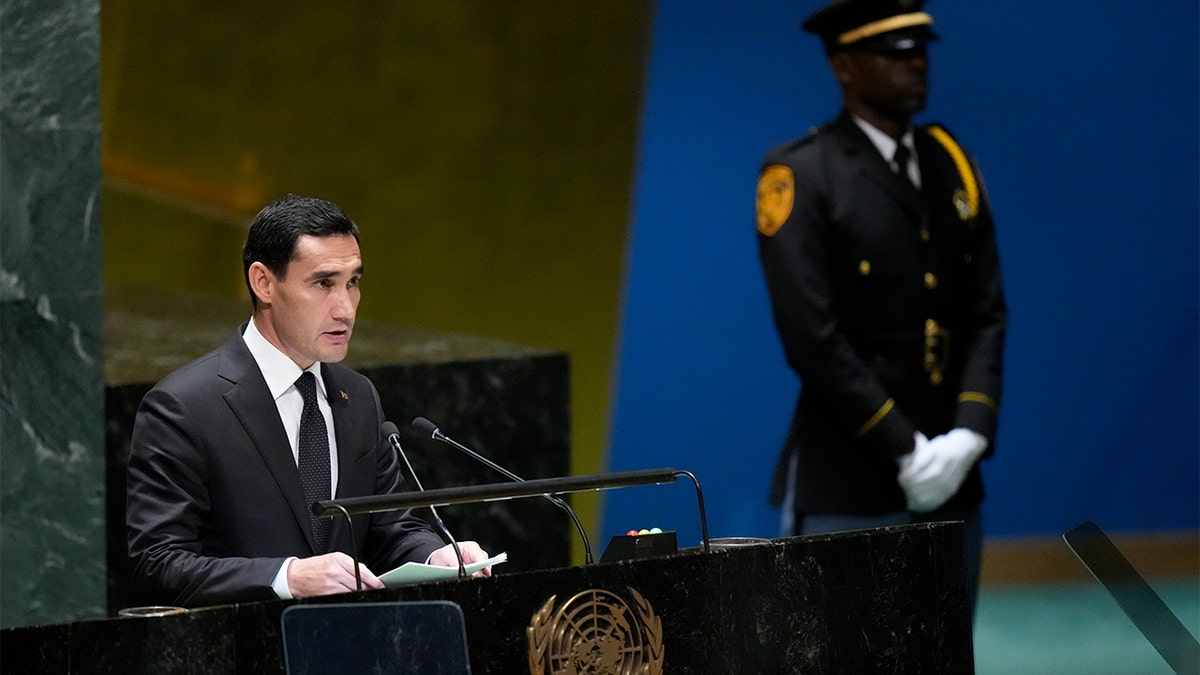
Turkmenistan President Serdar Berdimuhamedov addresses the 78th session of the United Nations General Assembly, Tuesday, Sept. 19, 2023 at United Nations headquarters. (AP Photo/Mary Altaffer)
“All of them, despite their difference in appearance, influence the course of interstate relations, [to] a greater or lesser extent,” he said.
UKRAINE
Ukraine President Volodymyr Zelenskyy accused Russia of “weaponizing” everything from food and energy to abducted children in its war against his country.
He warned world leaders that the same thing could happen to them.
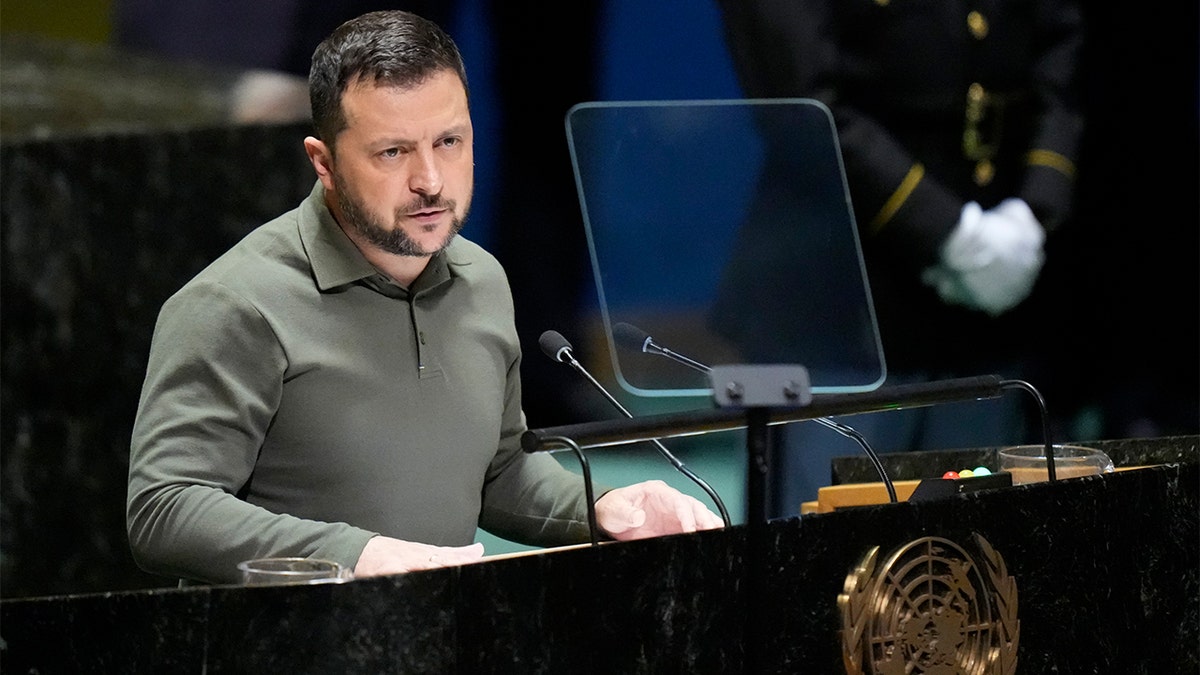
Ukranian President Volodymyr Zelenskyy addresses the 78th session of the United Nations General Assembly, Tuesday, Sept. 19, 2023 at United Nations headquarters. (AP Photo/Mary Altaffer)
“When hatred is weaponized against one nation, it never stops there,” he said at the U.N. General Assembly’s annual top-level meeting. “The goal of the present war against Ukraine is to turn our land, our people, our lives, our resources into weapons against you — against the international rules-based order.”
GUATEMALA
In his last speech to the United Nations, Guateleman President Alejandro Giammattei promised he would step down come January 14, after appealing the electoral victoria of his opponent Bernardo Arévalo.
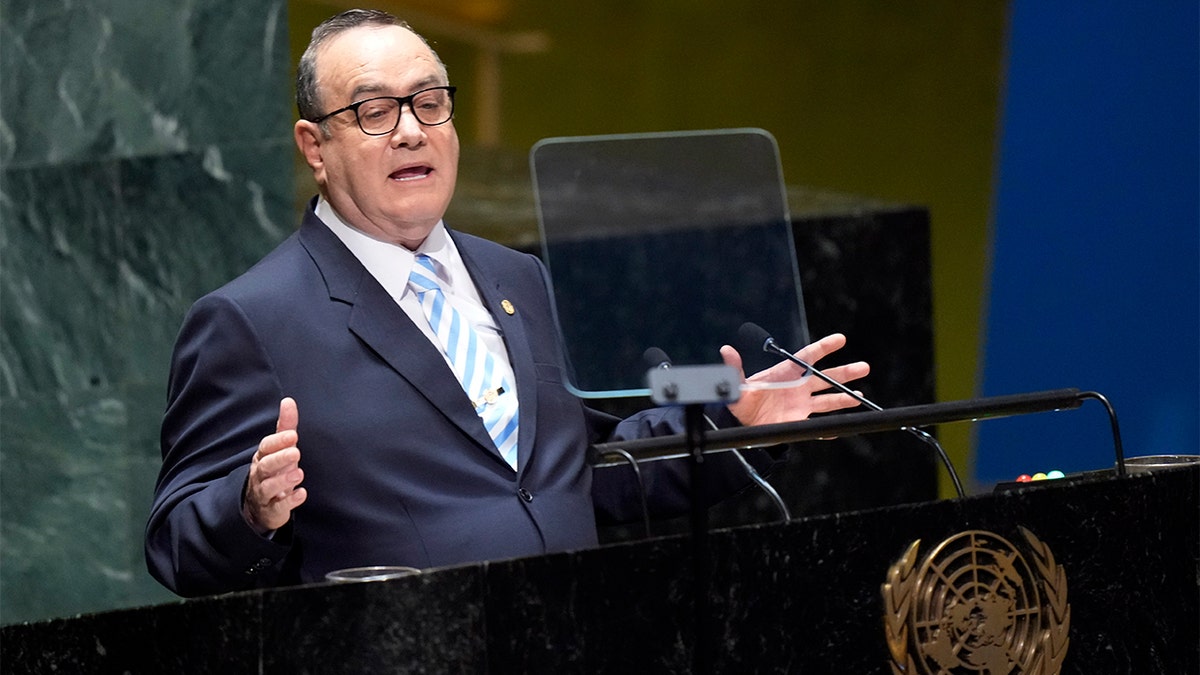
Guatemalan President Alejandro Giammattei Falla addresses the 78th session of the United Nations General Assembly, Tuesday, Sept. 19, 2023 at United Nations headquarters. (AP Photo/Mary Altaffer)
“Different from the lack of truth that we have heard today on this podium, I will hand over power to whoever was elected by the sovereign majority will of the people of Guatemala on January 14, when my constitutional mandate is fulfilled,” Giammattei said, criticizing “international organizations” for carrying out an “unnecessary” intervention” in Guatemalan elections.
HUNGARY
Hungarian President Katalin Novák spoke of the need to support Ukraine, as well as strengthening families, and the importance of parental freedom.
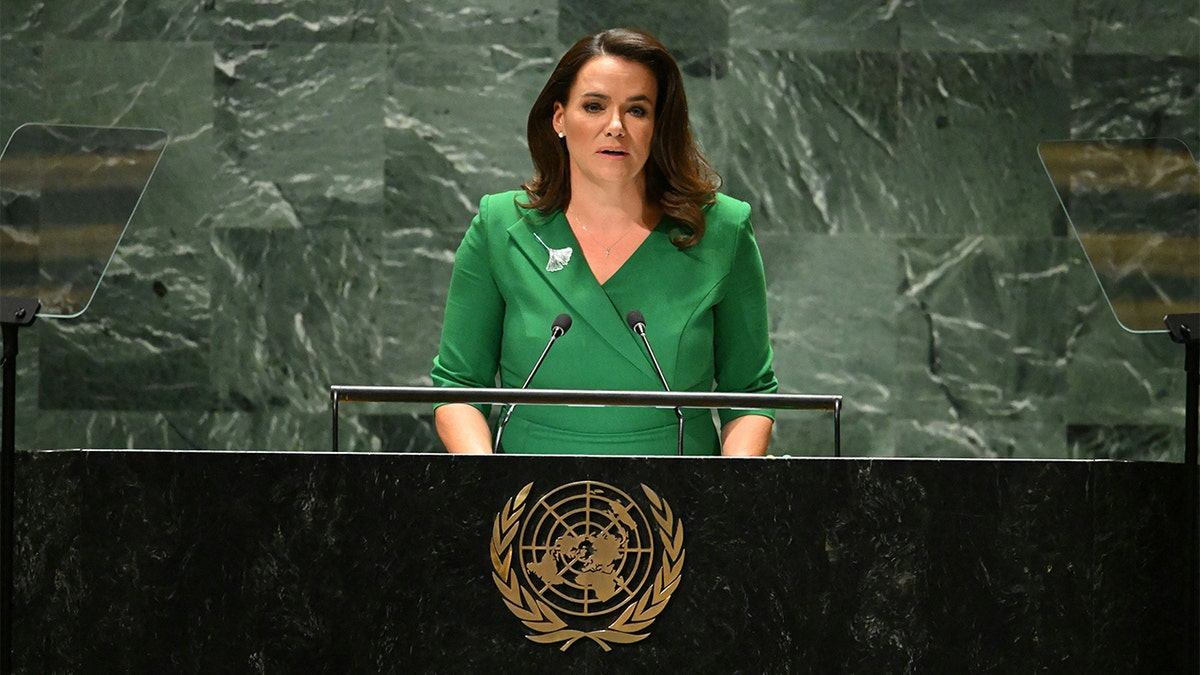
Hungarian President Katalin Novak addresses the 78th United Nations General Assembly at UN headquarters in New York City on September 19, 2023. (TIMOTHY A. CLARY/AFP via Getty Images)
SWITZERLAND
Swiss President Alain Berset said: “In the context of armed conflicts, the lack of access to basic services claims many more lives than confrontations because it depends on inequalities.”
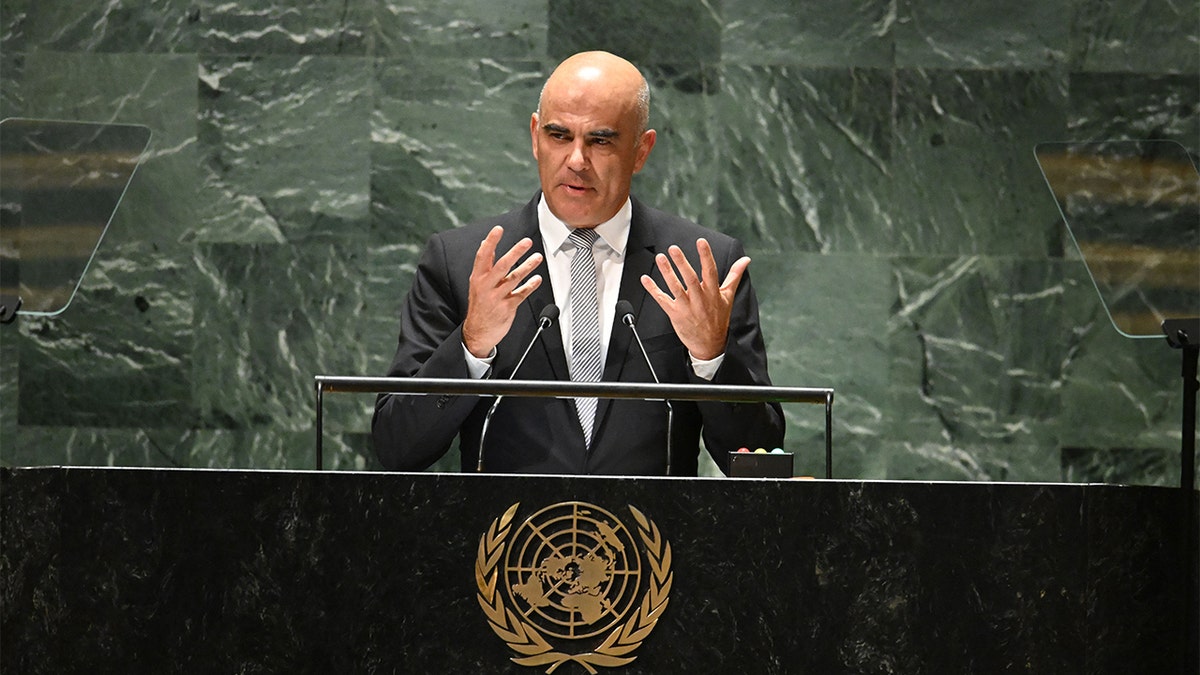
Swiss President Alain Berset addresses the 78th United Nations General Assembly at UN headquarters in New York City on September 19, 2023. (TIMOTHY A. CLARY/AFP via Getty Images)
SLOVENIA
Slovenian President Nataša Pirc Musar warned that “business as usual is not working if it’s failing us all.”
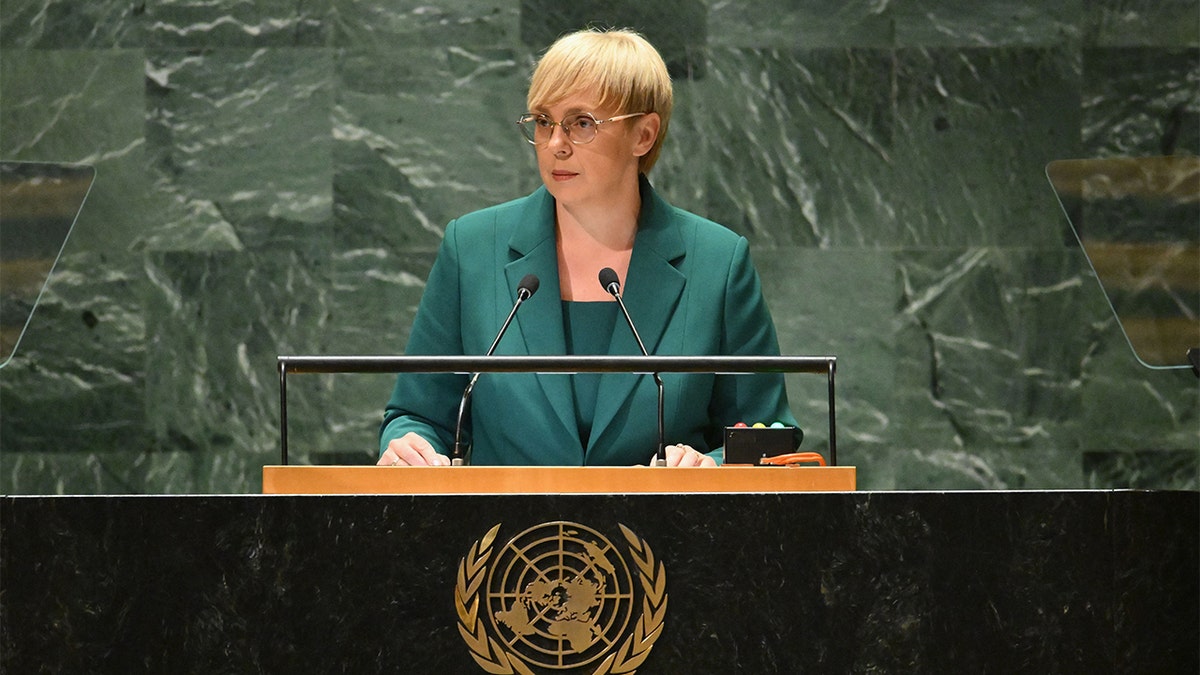
Slovenian President Natasa Pirc Musar addresses the 78th United Nations General Assembly at UN headquarters in New York City on September 19, 2023. (ANGELA WEISS/AFP via Getty Images)
“Climate change is the greatest challenge of our time. The catastrophic floods that hit Slovenia in August are just one more event among the many, many events around the world that prove the point. I trust that we will be able to overcome the consequences of the floods.”
UZBEKISTAN
Uzbek President Shavkat Mirziyoyev spoke out against forced child labor.
“Our experience shows that it is possible to put an end to this,” he said.
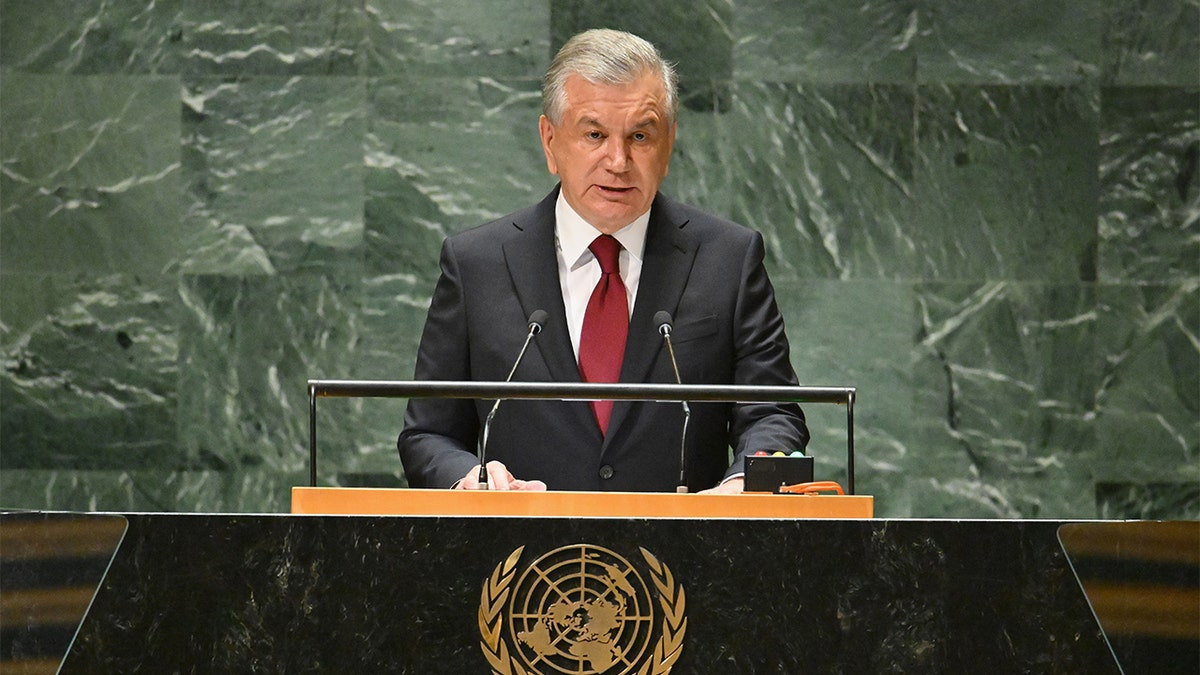
Uzbek President Shavkat Mirziyoyev addresses the 78th United Nations General Assembly at UN headquarters in New York City on September 19, 2023. (ANGELA WEISS/AFP via Getty Images)
Mirziyoyev highlighted the need to expand education and create jobs, saying such things were instrumental in eradicating poverty.
BOLIVIA
Bolivian President Luis Arce spoke out forcefully against capitalism which, he argued, exacerbated global inequality. He also spoke of the “suffering” of the Palestinian people and criticized sanctions as ultimately hurting civilians.
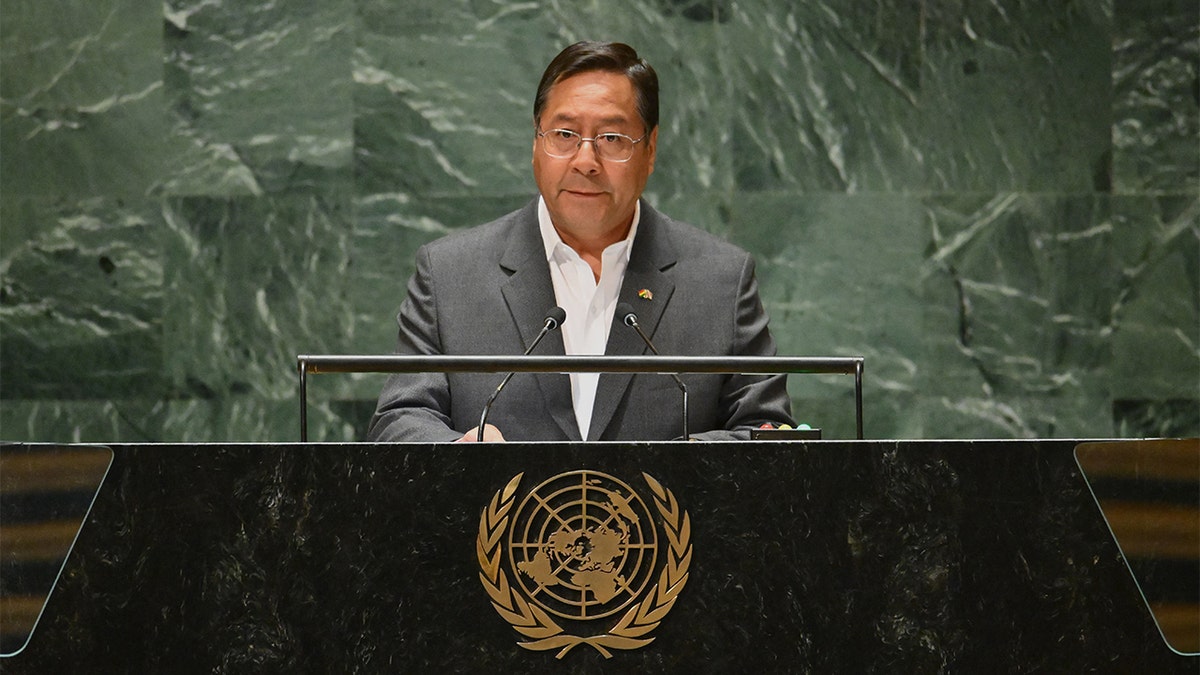
Bolivian President Luis Alberto Arce Catacora addresses the 78th United Nations General Assembly at UN headquarters in New York City on September 19, 2023. (Photo by ANGELA WEISS/AFP via Getty Images)
He lamented that “peacekeeping” has become more unattainable amid increases in wartime spending.
KAZAKHSTAN
Kazakh President Kassym-Jomart Tokayev proposed nuclear disarmament, noting that his country gave up its arsenal some 30 years ago. At the time, Kazakhstan had the fourth-largest number of nuclear weapons.
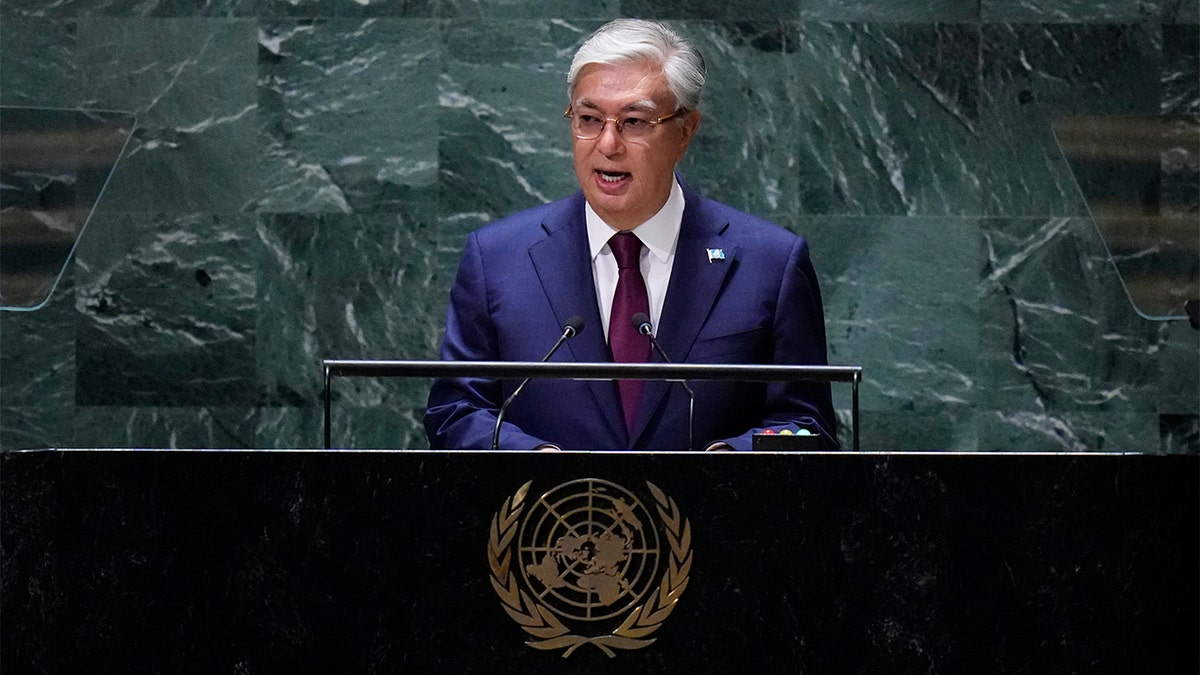
Kazakhstan’s President Kassym-Jomart Tokayev addresses the 78th session of the United Nations General Assembly, Tuesday, Sept. 19, 2023 at U.N. headquarters. (AP Photo/Frank Franklin II)
IRAN
Iranian President Ebrahim Raisi took shots at the West, saying certain nations “are attempting to incite conflicts in different regions employing a cold war mentality.”
Reading from the Koran, Raisi said Iran “has played a significant role in defeating the global arrogance.”
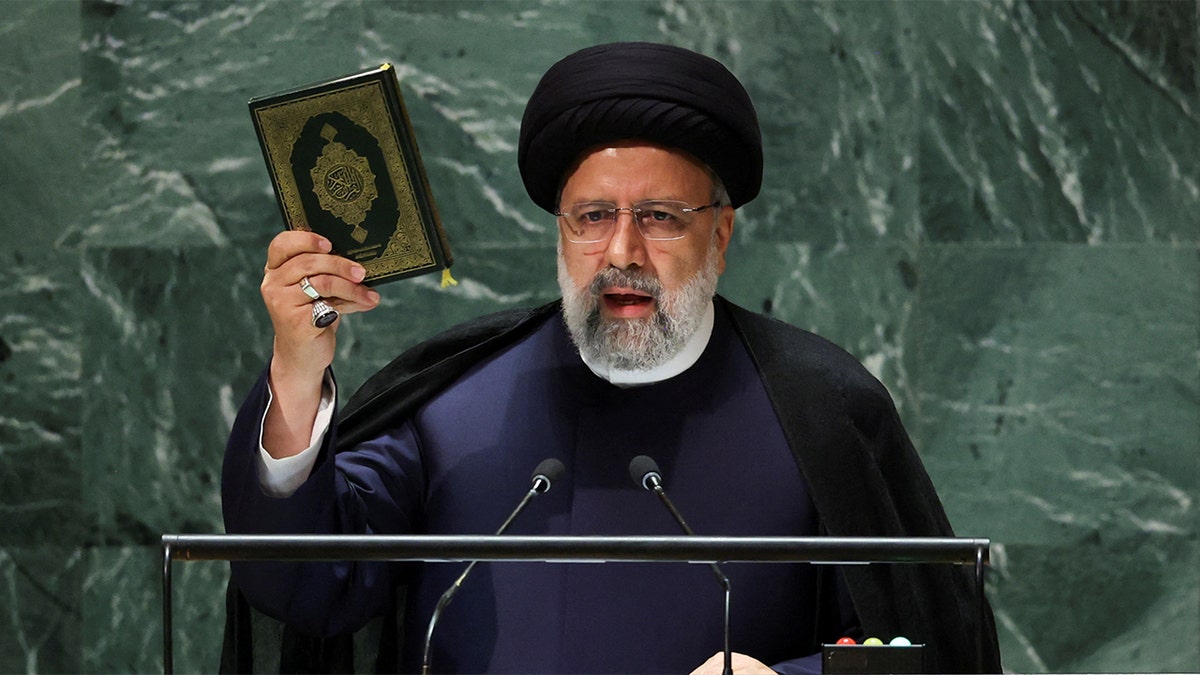
Iran’s President Ebrahim Raisi holds up the Holy Quran as he addresses the 78th Session of the U.N. General Assembly in New York City, U.S., September 19, 2023. (REUTERS/Mike Segar)
His appearance at the UN General Assembly meeting brought mass protests, with demonstrators denouncing his appearance. Israel’s Ambassador to the UN Gilad Erdan left the meeting in protest.
ALGERIA
Algerian President Abdelmadjid Tebboune homed in on the plight of the Palestinians. He called upon the UN to grant Palestine permanent member status.
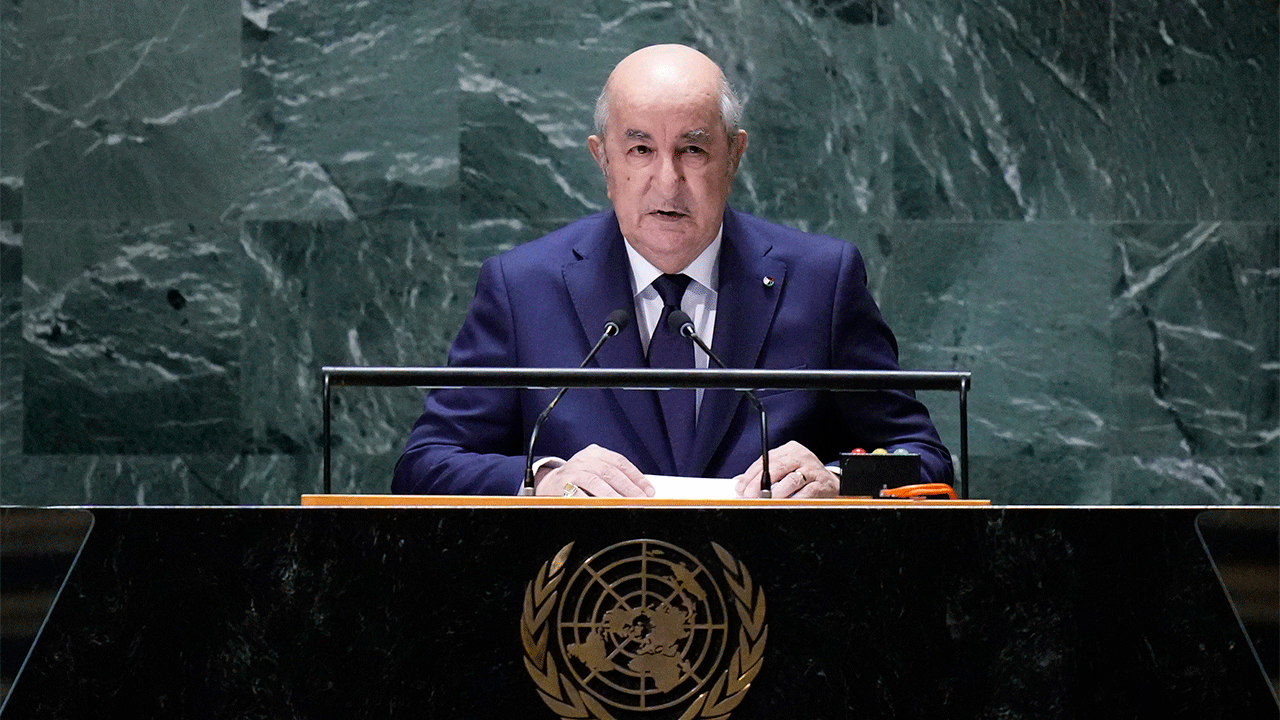
Algerian President Abdelmadjid Tebboune addresses the 78th session of the United Nations General Assembly, Tuesday, Sept. 19, 2023 at U.N. headquarters. (AP Photo/Frank Franklin II)
ARGENTINA
President Alberto Fernández referenced the recent flare-up in Azerbaijan, where military forces have started to take control of the contested Nagorno Karabakh region.
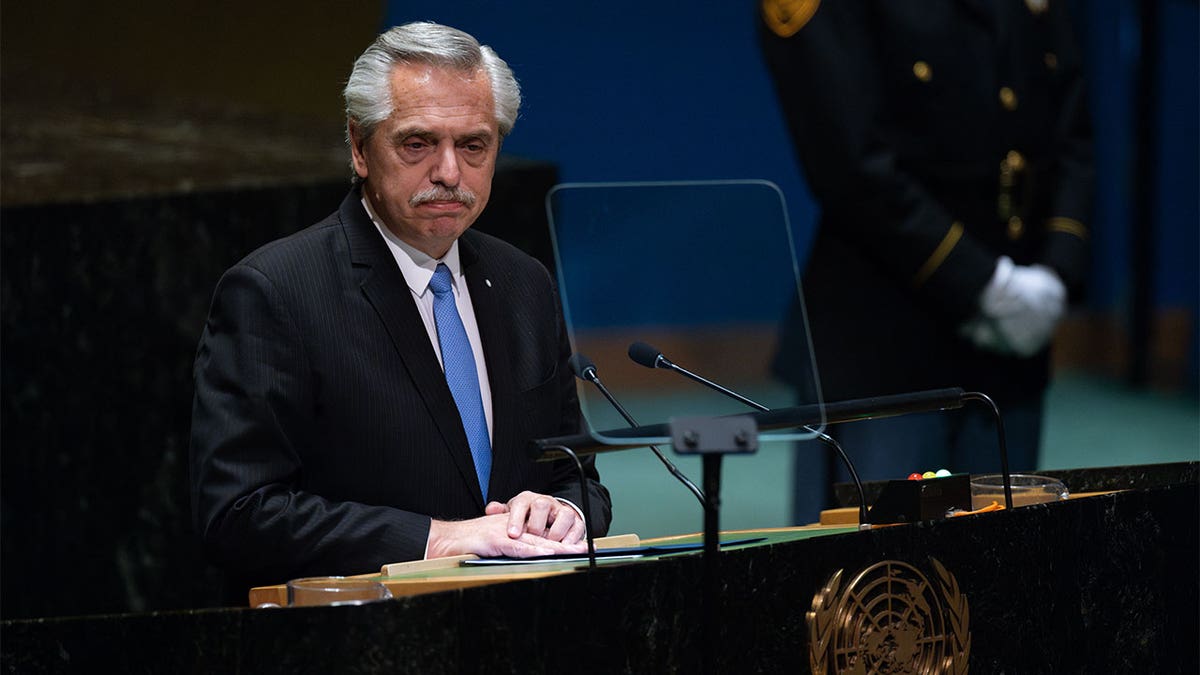
NEW YORK, NEW YORK – SEPTEMBER 19: President Alberto Fernández of Argentina addresses the 78th session of the United Nations General Assembly (UNGA) at U.N. headquarters on September 19, 2023, in New York City. (Adam Gray/Getty Images)
“The international community cannot remain indifferent to this reality,” he said. “It must act preventively to avoid new ethnic, racial, religious, or political persecution.”
EL SALVADOR
El Salvadoran President Nayib Bukele touted his country’s success in tackling its gang problem.
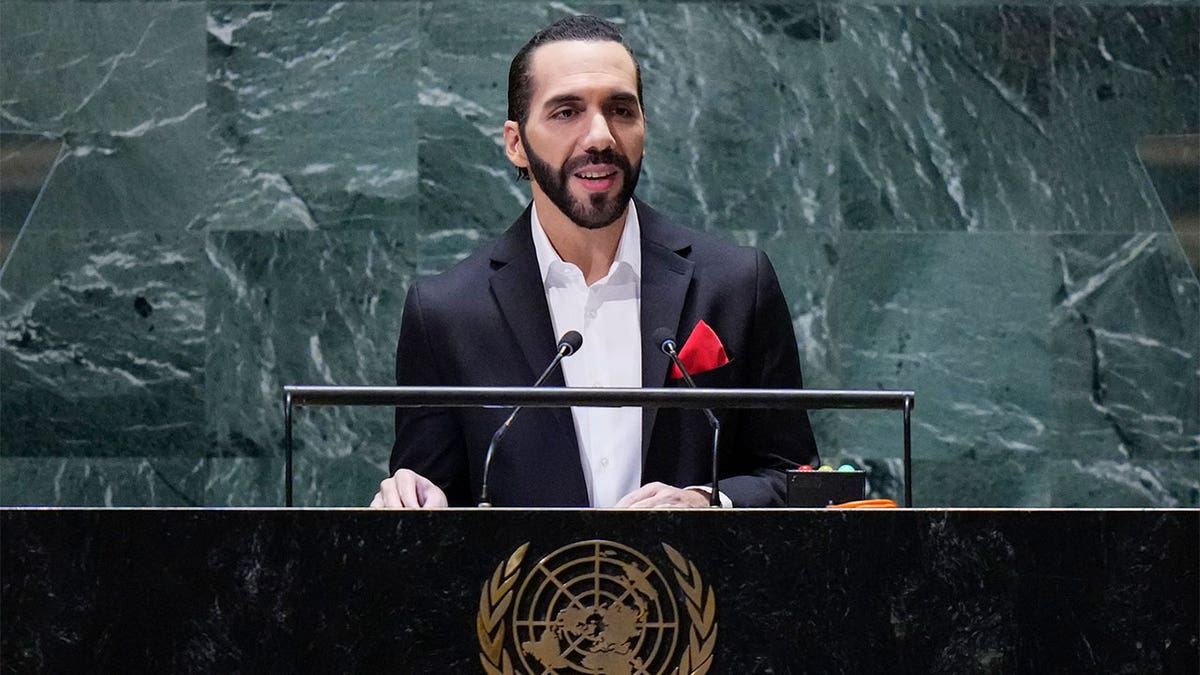
Nayib Bukele, President of El Salvador, addresses the 78th session of the United Nations General Assembly, Tuesday, Sept. 19, 2023, at U.N. headquarters. (AP Photo/Frank Franklin II)
“El Salvador went from being literally the most dangerous country in the world, to being the safest in Latin America,” he said.
KYRGYZSTAN
Kyrgyz President Sadyr Zhaparov said the world was “at a turning point” and that the “negative” changes in the world order were becoming apparent.
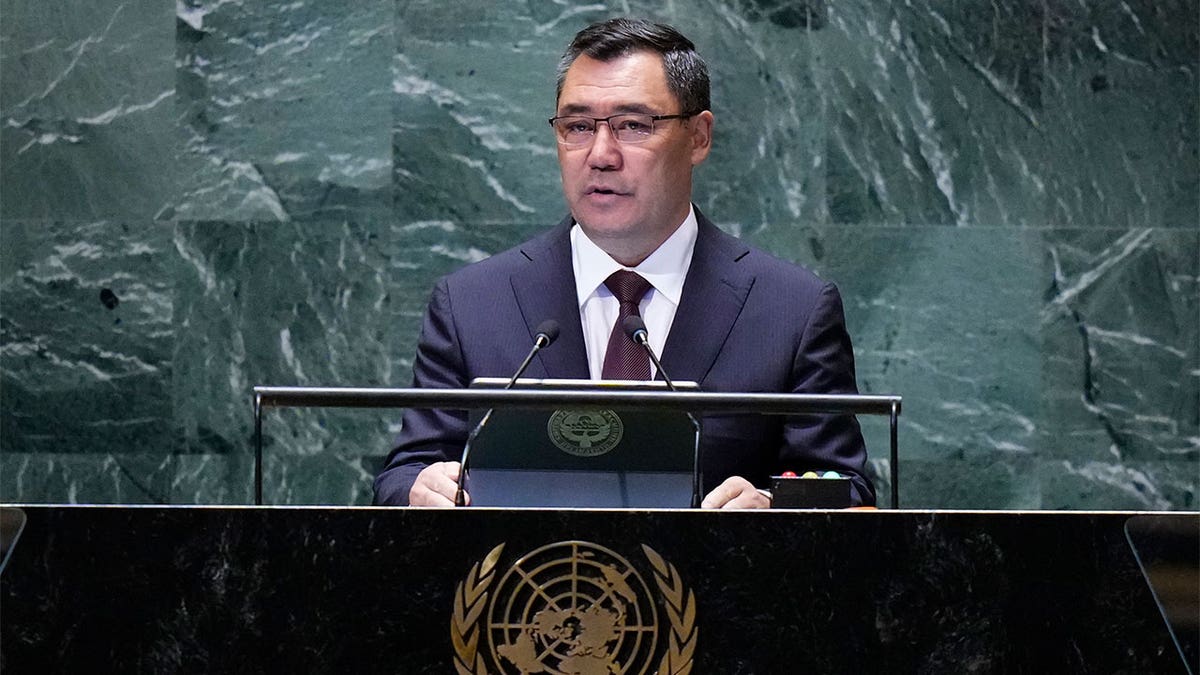
Kyrgyzstan’s President, Sadyr Zhaparov, addresses the 78th session of the United Nations General Assembly, Tuesday, Sept. 19, 2023, at U.N. headquarters. (AP Photo/Frank Franklin II)
“Geopolitical tensions are moving to the fact that the world is moving towards fragmentation, into regional, sub-regional, financial blocs and systems,” he said. “It is also obvious that the governments of various countries will be compelled or forced to make economic, technological, and geopolitical choices.”
PARAGUAY
Paraguayan President Santiago Peña Palacios warned that multilateralism faces “very visible challenges in terms of efficacy and legitimacy.”
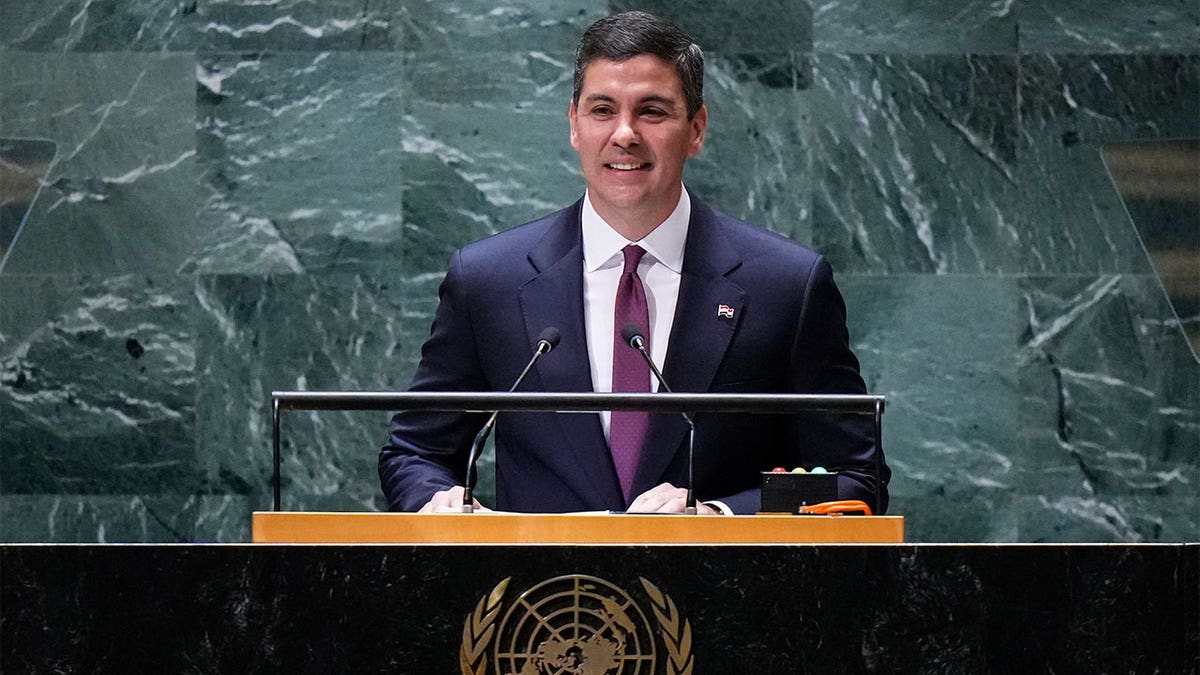
Paraguay’s President Santiago Peña addresses the 78th session of the United Nations General Assembly, Tuesday, Sept. 19, 2023 at U.N. headquarters. (AP Photo/Frank Franklin II)
“In a world of so much wealth, levels of poverty and inequality continue to be stubbornly high,” he said, adding that current institutions were ill-equipped to tackle the migration crisis, climate change, and transnational climate.
PERU
Peruvian President Dina Ercilia Boluarte Zegarra touted her humble upbringing that led her to become the first female president of Peru.
She said her administration has managed to restore order after an unsuccessful self-coup attempt by her predecessor in December.
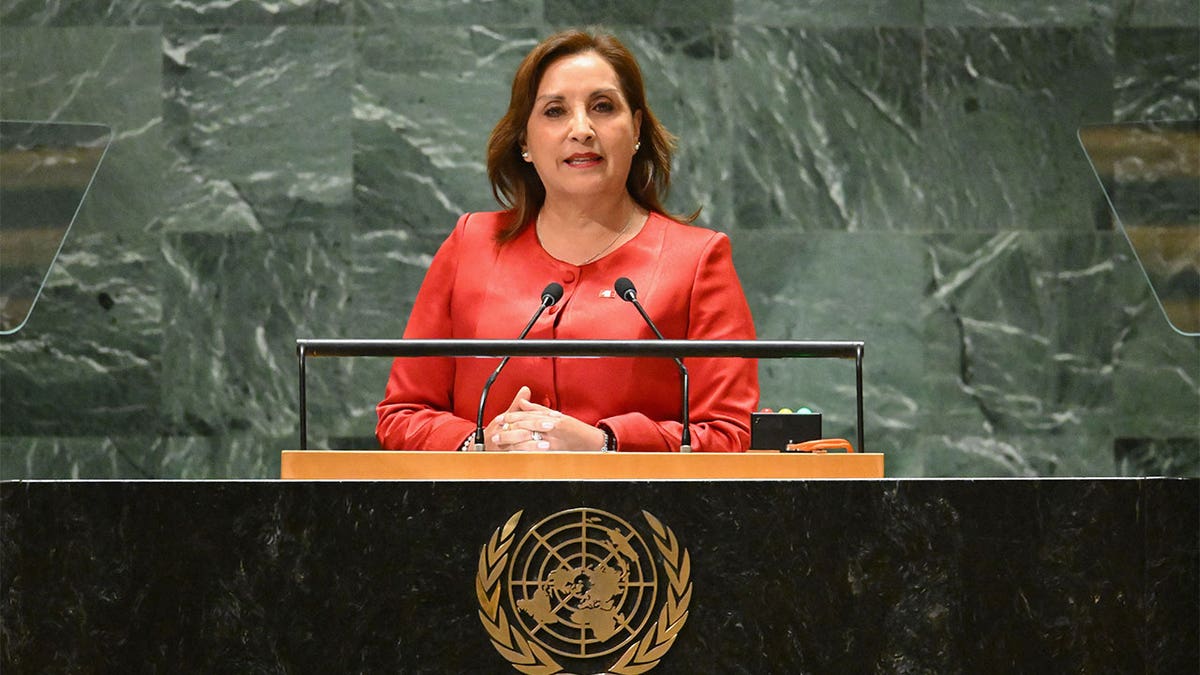
Peruvian President Dina Boluarte addresses the 78th United Nations General Assembly at UN headquarters in New York City on September 19, 2023. (ANGELA WEISS/AFP via Getty Images)
“Eradicating poverty is the greatest challenge facing the world and constitutes an essential prerequisite for sustainable development,” she said. “This is the main objective of my government and it is why we are committed to the implementation of the sustainable development goals of the 2030 agenda.”
MOZAMBIQUE
Mozambican President Filipe Nyusi said the world continues to be faced “with interconnected crises that undermine” the Assembly’s sustainability goals.
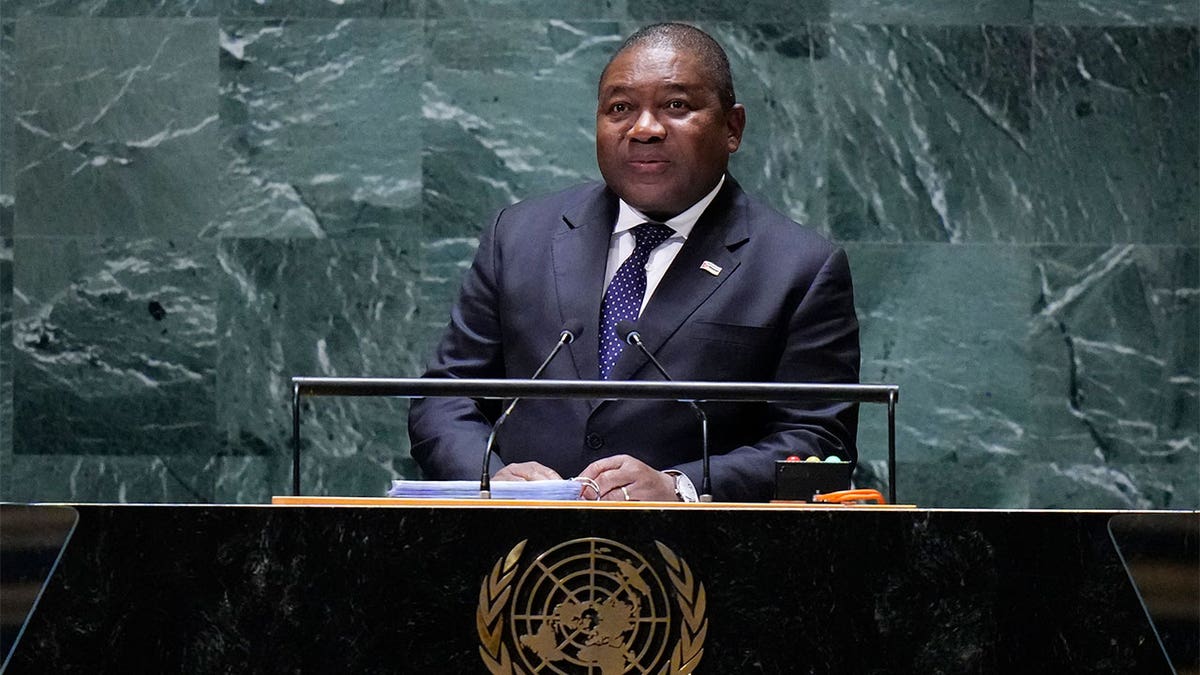
Filipe Jacinto Nyusi, President of Mozambique, addresses the 78th session of the United Nations General Assembly, Tuesday, Sept. 19, 2023, at U.N. headquarters. (AP Photo/Frank Franklin II)
“Indeed the COVID-19 pandemic, natural disasters rising from climate change, and armed conflicts including terrorism [and] violent extremism causes millions of people to continue living in poverty without adequate food and without access to education and health services,” he said.
PANAMA
Panamanian President Laurentino Cortizo Cohen reiterated his country’s commitment to the 2030 agenda and its 17 sustainability goals. He said his government was pursuing measures to tackle poverty.
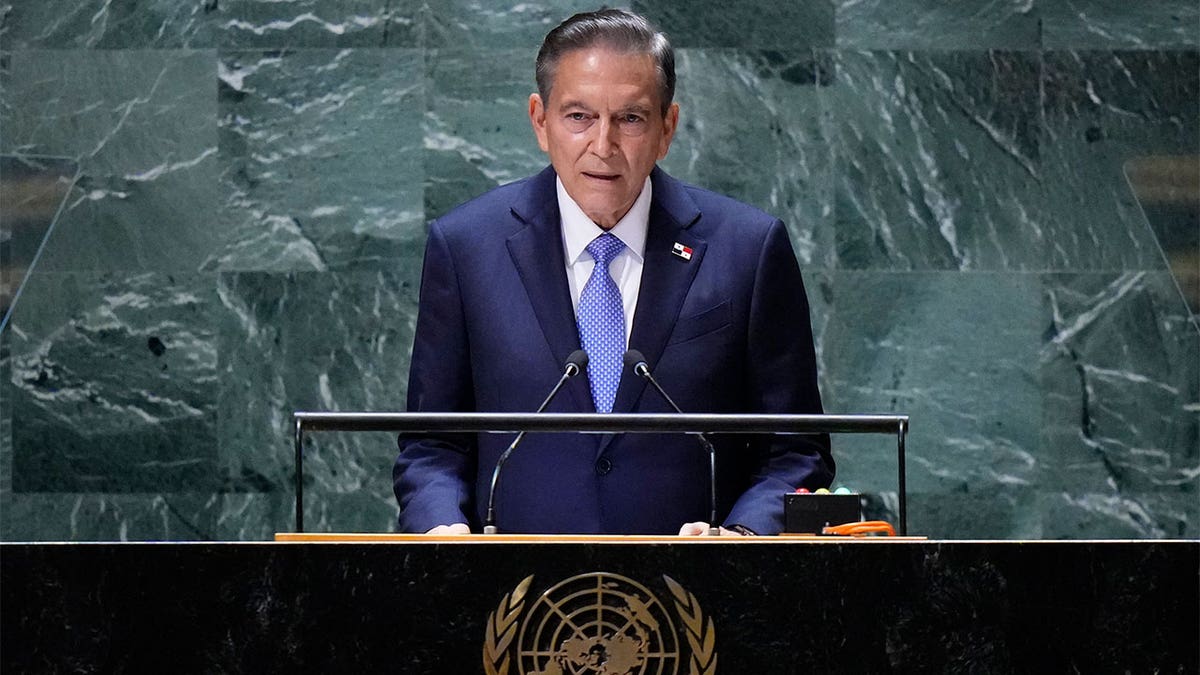
Laurentino Cortizo, President of Panama, addresses the 78th session of the United Nations General Assembly, Tuesday, Sept. 19, 2023 at U.N. headquarters. (AP Photo/Frank Franklin II)
He noted his country’s particular vulnerability amid rising sea levels from climate change.
NIGERIA
President Bola Tinubu lamented that “many proclamations have been made, yet our troubles remain close at hand.”
He railed against “exploitation” from abroad, saying such practices have exacted a heavy toll on Africa’s ability “to progress.”
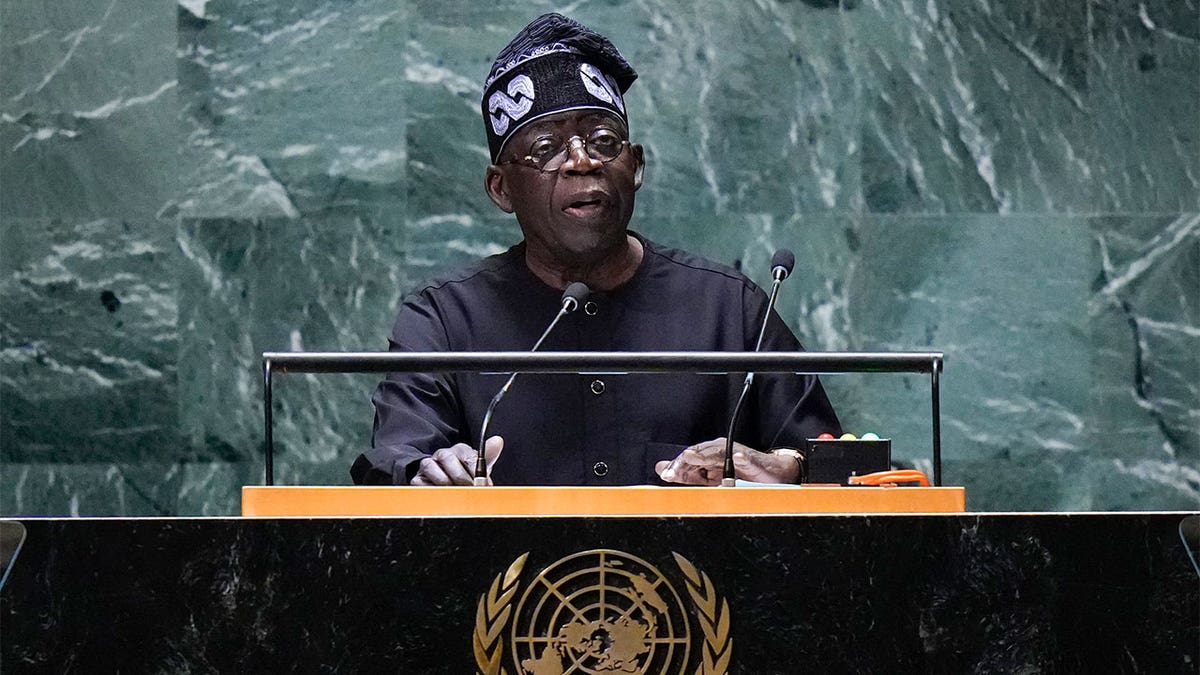
Bola Ahmed Tinubu, President of Nigeria, addresses the 78th session of the United Nations General Assembly, Tuesday, Sept. 19, 2023 at U.N. headquarters. (AP Photo/Frank Franklin II)
“If this year’s theme is to mean anything at all, it must mean something special, particularly to Africa,” he said.
URUGUAY
Uruguayan President Luis Lacalle Pou said the nations of the well-being of the nations of the world were “intrinsically linked to the common good.”
“We need to be aware of this, accept it, and act as a result,” he said.
He ended his speech by urging nations to condemn Russia’s war against Ukraine and stand with the Ukrainian people.
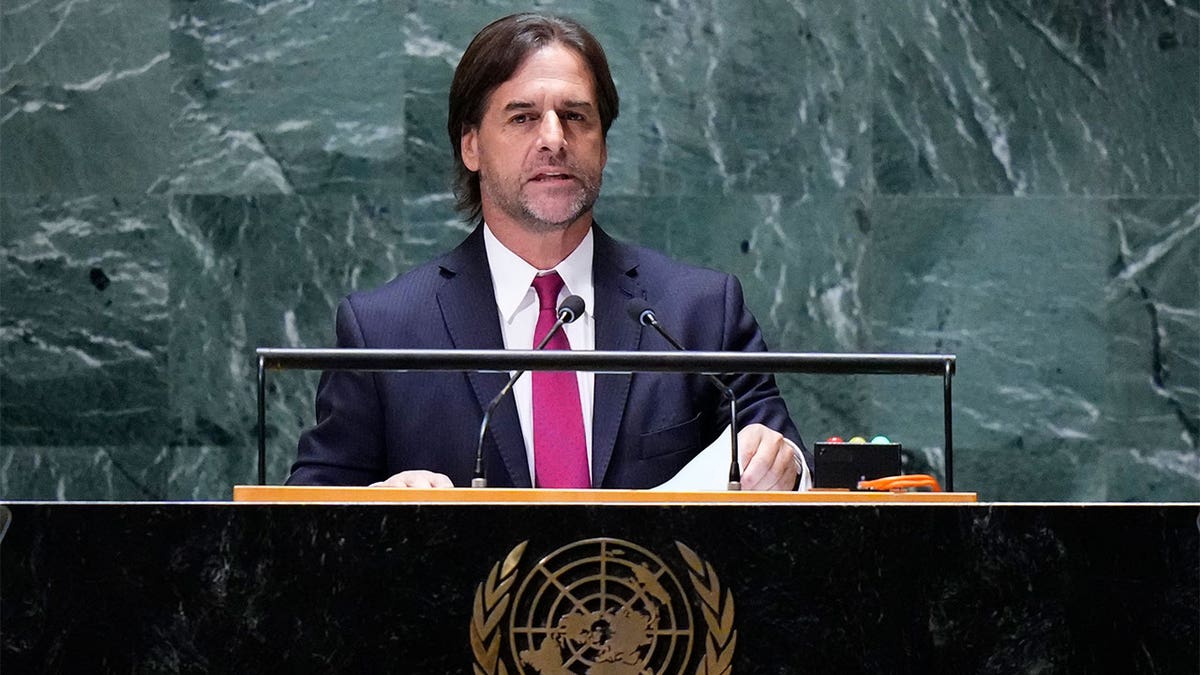
Uruguay President Luis Lacalle Pou addresses the 78th session of the United Nations General Assembly, Tuesday, Sept. 19, 2023, at U.N. headquarters. (AP Photo/Frank Franklin II)
CZECHIA
Czech President Petr Pavel denounced Russia’s aggression against Ukraine, recounting his experience touring war-ravaged areas.
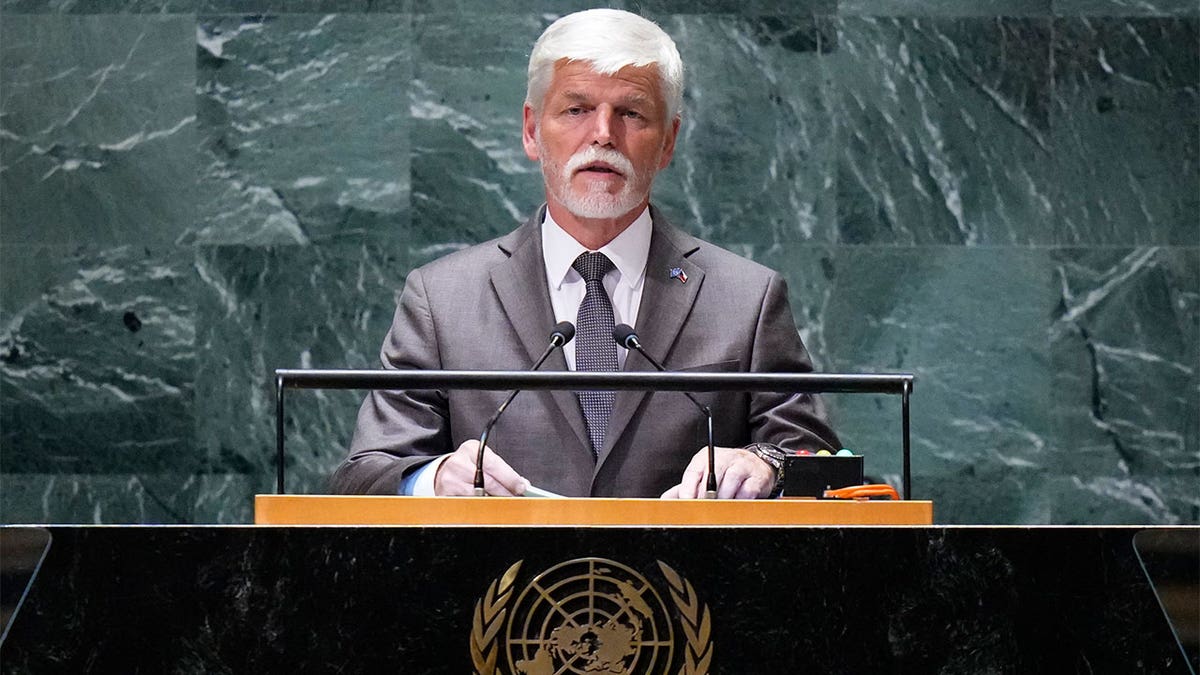
Czechia’s President Petr Pavel addresses the 78th session of the United Nations General Assembly, Tuesday, Sept. 19, 2023, at U.N. headquarters. (AP Photo/Frank Franklin II)
“Russia must unconditionally withdraw all troops from the entire territory of Ukraine within its internationally recognized borders. Russia’s leaders must be held accountable for the crime of aggression against its neighbor,” he said.
PALAU
Palauan President Surangel Whipps, Jr. said his nation was struggling under the twin issues of climate change and the high cost of imported food.
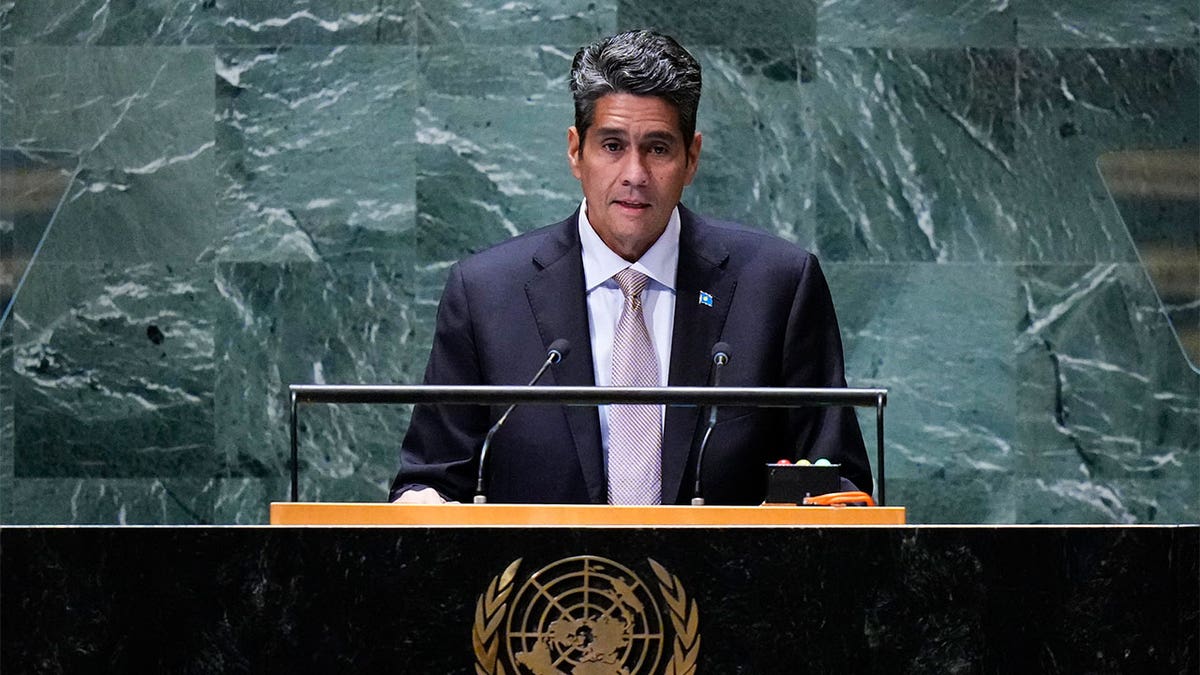
Palau President Surangel Whipps Jr. addresses the 78th session of the United Nations General Assembly, Tuesday, Sept. 19, 2023, at U.N. headquarters. (AP Photo/Frank Franklin II)
“Like other [Small Island Developing States] Palau is working to build a diverse and resilient economy,” as he recounted his nation’s struggles with a downturn in the economy, heavily reliant on tourism.
SENEGAL
Senegalese President Macky Sall said that since the General Assembly’s last session, “the state of the world has not improved.”
“For millions of people, daily life is one of fear, violence, poverty, and inequalities,” Sall said, noting the social and economic impact from the COVID-19 pandemic.
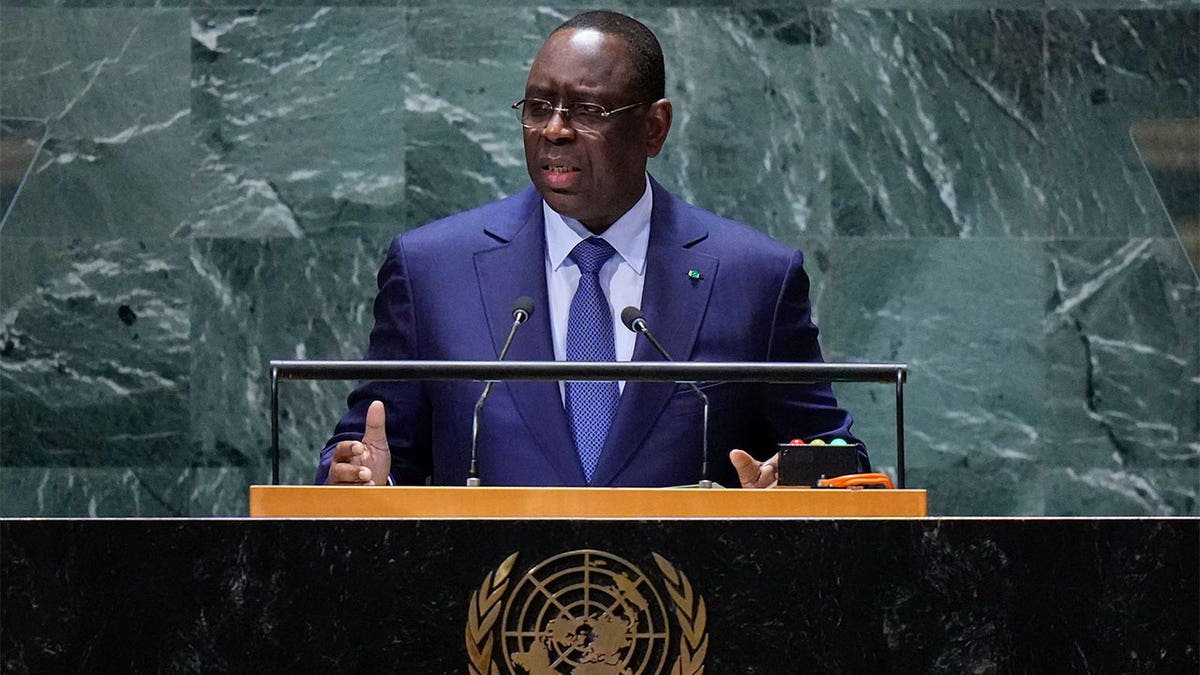
Macky Sall, President of Senegal, addresses the 78th session of the United Nations General Assembly, Tuesday, Sept. 19, 2023 at U.N. headquarters. (AP Photo/Frank Franklin II)
“Climate change has reached an unprecedented level. The tragedy of illicit migration reminds us of the need to implement the global compact for safe, orderly, and regular migration.”
GERMANY
Germany Chancellor Olaf Scholz invoked his own country’s divisive history and eventual reunification to underscore the importance of collaboration.
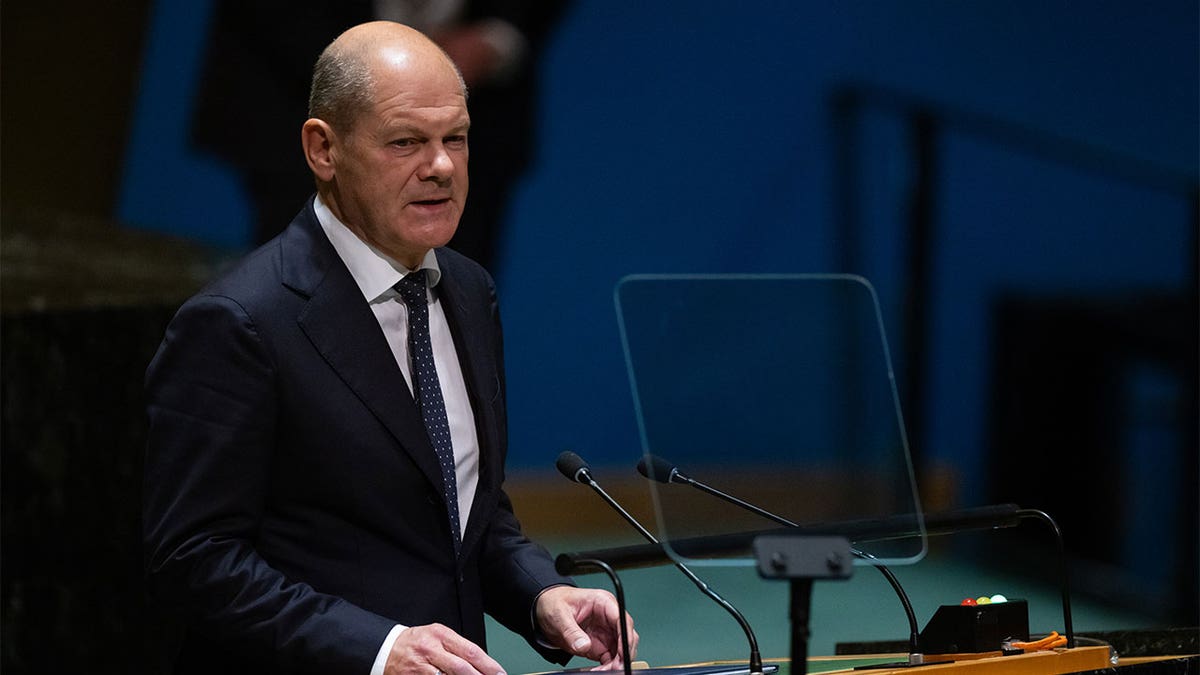
NEW YORK, NEW YORK – SEPTEMBER 19: Chancellor Olaf Scholz of the Federal Republic of Germany addresses the 78th session of the United Nations General Assembly (UNGA) at U.N. headquarters on September 19, 2023 in New York City. (Adam Gray/Getty Images)
“In a world in which we are increasingly dependent on each other, a policy for peace must not stop at our own doorstep.”
JAPAN
Japanese Prime Minister Fumio Kishida said the world stands at a “historical inflection point.”
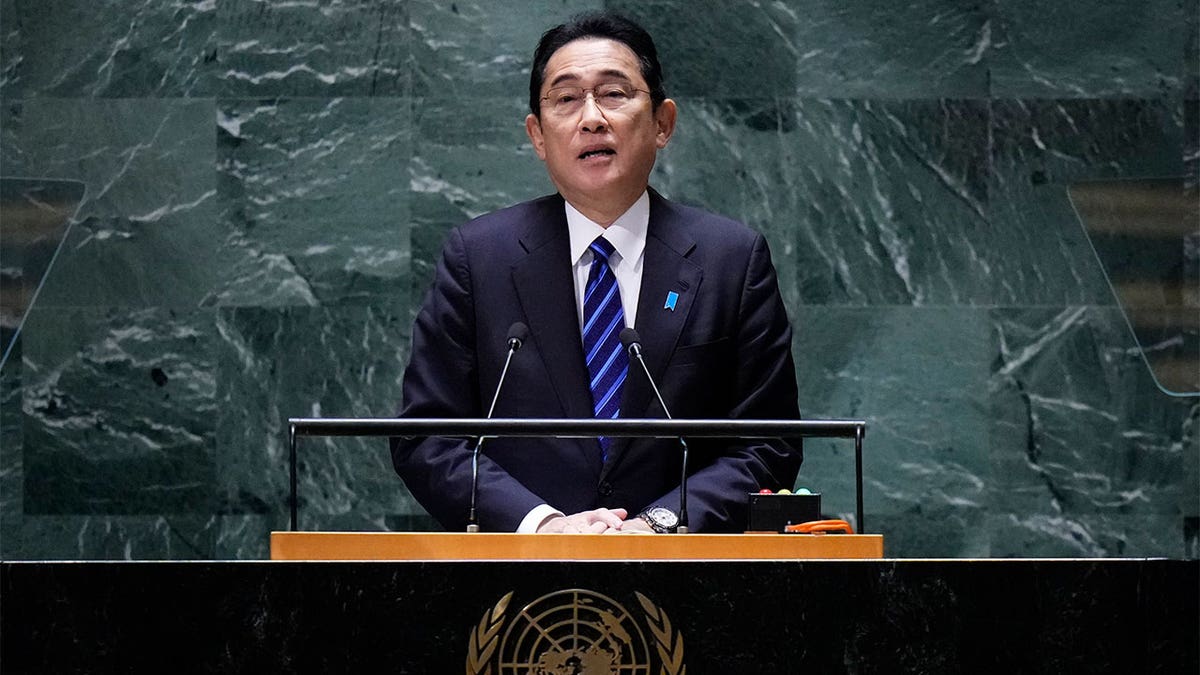
Japan’s Prime Minister Fumio Kishida addresses the 78th session of the United Nations General Assembly, Tuesday, Sept. 19, 2023, at U.N. headquarters. (AP Photo/Frank Franklin II)
He said the global community should respond to “please of vulnerable people seeking help and work towards a world filled with cooperation and not division and confrontation.”
“This is my message to all the leaders of the member states,” he said.
CLICK HERE TO GET THE FOX NEWS APP
Fox News Digital’s Chris Pandolfo and The Associated Press contributed to this report.
[ad_2]
Source link